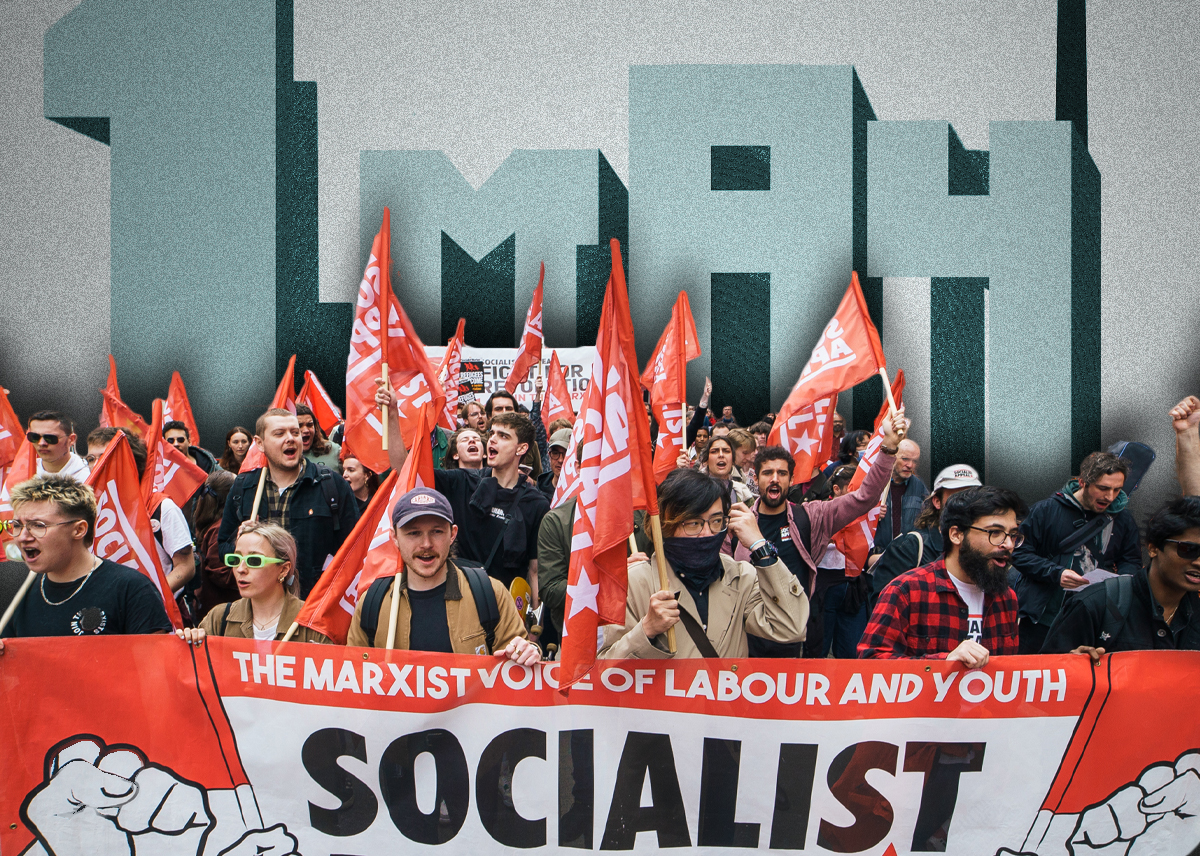
On 1 May, International Workers’ Day, comrades of the International Marxist Tendency (IMT) mobilised all over the globe, raising the standard of revolutionary Marxism. We raised our banners, flags and voices; and through dozens of speeches, and the distribution of thousands of newspapers, books, pamphlets and leaflets, we were able to connect Marxist ideas with more people than ever. Below is a taster of some of this activity.
Click on the links below to jump to the reports of the magnificent work of our comrades all around the world!
Argentina, Austria, Belgium, Brazil, Britain, Canada, Chile, Colombia, Czechoslovakia, Denmark, El Salvador, Finland, France, Germany, Greece, Italy, Mexico, Netherlands, Nigeria, Pakistan, Spain, Sweden, Switzerland, United States, Venezuela, Yugoslavia
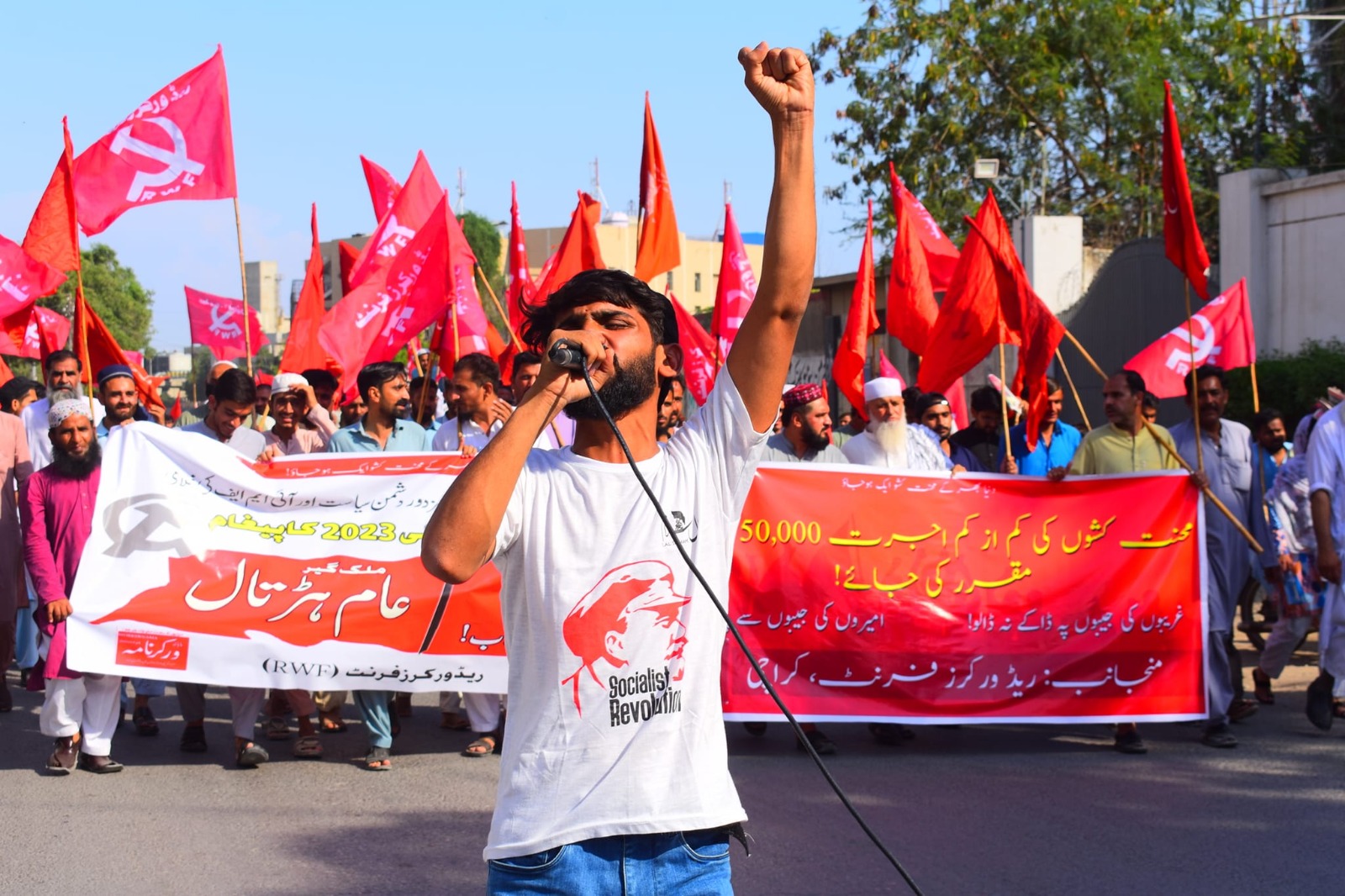
A tale of two May Days
So far, we’ve received reports of activity from 26 countries, more than we’ve ever reported on before. Some saw our biggest IMT May Day interventions ever. Over 100 comrades formed a revolutionary bloc in London. In Copenhagen, we attracted hundreds to our event. In Austria and Sweden, IMT comrades made it onto national television and newspapers. Everywhere we find the same thing: the Marxist presence was bold, enthusiastic, militant and, above all, youthful.
What a sad contrast with the official labour movement leaderships. Instead of inspiring a fighting spirit, we’ve the same thing in many countries: official ‘organisers’ acting like a smothering, wet rag.
Here and there this has led to an unfortunate situation of splitting May Day, with more radical layers organising separately. In other countries, it has meant dwindling, ageing attendances.
In Nigeria, our comrades report on how leaders of the NLC and TUC gave space over to newly-elected, right-wing governors, whilst a mood of frustration bubbled at rallies that the union leaders were not properly addressing the absolute agony workers are living through.
Even with Lula present in São Paulo, Brazil, organisers were unable to attract numbers approaching those seen in previous years. Workers are looking for a solution to their dire needs – not an opportunity to cheer on a class collaborationist government.
With a backdrop of unrelenting capitalist crisis and a revival of industrial militancy in many countries, these ought to be ideal conditions for a revival of the May Day tradition! Indeed, where there is some focal point for working-class struggle, we have seen something of a revival. Recent events in Austria have fed into larger, more political demonstrations nationwide. In Britain, rising industrial activity has also given a boost to May Day. And, above all, in France, we saw a phenomenal two million people on the streets in the wake of the struggle against Macron’s pension reform.
Over decades, class collaborationist trade union and ‘left’ leaderships have shamefully allowed the May Day tradition to fall into neglect. Preferring cosy deals with the bosses to militant struggle, they have had no interest in this celebration of proletarian internationalism.
But where they have dropped the banner, we, the Marxists, will take it up, and strive to return 1 May to its roots, to make it once more a day of the world proletarian struggle against our common class enemy: the capitalist class and their system.
Argentina
The inability of the Argentine state to pay off its mounting debts is driving the economic, social and political crisis that the country has been traversing. This is the specific expression in Argentina of the organic crisis that is affecting world capitalism as a whole.
The bosses have imposed starvation wages and precarious work contracts in the midst of a health and housing crisis. Poverty impacts 40 percent of the population, while the informal sector constitutes 55 percent of the economy. While austerity measures hit workers’ ability to even afford food, the bosses’ parties – allied with different layers of the trade union bureaucracy – merely discuss the manner in which they are to be applied.
In this context, the comrades of Corriente Socialista Militante, the IMT in Argentina, mobilised in the city of Rosario and simultaneously in Buenos Aires. We raised the need to prepare a general strike and bring to power a workers’ government, pointing out the limitations of a struggle based solely on the trade unions and explaining the need for the working class to seize political power.
We know that without revolutionary theory there is no revolutionary movement, and hence we came equipped with books, magazines, newspapers and leaflets, which were available for all the comrades, workers, fighters, and youth who attended the events.
The class struggle is sharpening in Argentina and explosive events are being prepared. The Argentine section of the IMT were part of this international celebration of the working class, fighting for the militant traditions that 1 May should represent.
Austria
May Day in Austria is traditionally the most important day of mobilisation and celebrations for the working class and the left. This year it expressed a wave of left-wing politicisation, characterised by three main turning points within a few weeks. Firstly, the impasse of the class-collaborationist leadership of the Social Democratic Party (SPÖ) has paved the way for a leadership contest with three competitors for party leader. Secondly, the most well-known SP left-winger, Andi Babler, announced that he would run. And thirdly, the Communist Party (CP) increased its share of the vote 32-fold in the regional election of Salzburg, gaining 11.7 percent of the votes.
These reflect the need of the working class to have an organisation which defends its economic, social and political rights against the effects of the multiple crises our class is suffering.
The Marxists of Der Funke called for people to join the Social Democratic Party to support the left-wing candidate Andi Babler (9,000 joined over the course of 36 hours), while advocating for a militant united front approach of SP and CP. This bold stance had an impact, reflected in our invitation to speak on an important national TV show.
The growing polarisation led to a noticeable increase in the number of people taking part in all the different demonstrations and festivities, which also had a more distinctly political character all across the country. We successfully used this to sell our paper (968 issues were sold nationwide) and collect money for our Pfingstseminar later in May.
In Vienna more than 100 comrades and sympathisers actively participated in our intervention. The big march organised by the SPÖ in the morning was the main focus. On top of that, we intervened at another five rallies around Vienna.
After the social democratic march, we intervened at the CP rally in front of the parliament, and blocks of 20-50 comrades participated at the internationalist demonstration, dominated by Turkish migrant communities, where we met a very friendly reception on the part of the organisers.
In the afternoon, comrades participated in the anarchist-led demonstration, but were verbally attacked by the organisers who insisted that there is no place for our stall and flags at this demonstration. As usual, the comrades did not back down from the anti-democratic pressure of this identity politics-based clique.
In Graz, the radicalisation of the youth and the workers found a new expression in the Communist Party that is now leading the city government. The bourgeoisie, distressed by this development, is putting pressure on the CP-SPÖ-Greens city government to implement cuts and drop their reform agenda. May Day would have been the perfect rallying point for a united offensive of the workers’ movement in Graz. However, the SPÖ tried to ignore the ferment inside their own party and held a demonstration, completely isolated from the working class with only 400 party functionaries.
At the same time 1,500 radicalised students and workers joined the CP demonstration, but the leadership failed to go on the offensive in the face of the attacks of the ruling class. 12 comrades took part in our intervention, we sold 57 papers.
In Linz, 15 comrades and sympathisers took part in the biggest intervention of the Marxists for years. We were able to exceed our paper sales goal by more than half, selling 97 papers.
Tyrol is known as the Austrian state with low wages and high costs of living and the capital Innsbruck is infamous for its horrendous rent prices. Four comrades participated at the SPÖ festival, which had around 250 people present, and raised more than €100 for our annual Pfingstseminar.
As in previous years, about 20 leftist organisations in Innsbruck, ranging from youth organisations, anarchists and immigrant associations, joined forces and organised a militant demonstration under the slogan, “Fight rising prices – overcome capitalism”. We participated with 13 comrades, a banner and a speech at the closing rally. By the end of the day, we had sold 70 papers.
In Vorarlberg, as we lead the Socialist Youth in the region, we participated at the May Day celebrations of the Social Democratic party, where we were able to raise a record collection for the national Pfingstseminar and sell more than 50 papers. One comrade held a speech pointing out the roots of the crisis of the SPÖ and the great potential of a left opposition against the government. She received enthusiastic applause.
Meanwhile, we were the main organisers of the May Day demonstration in capital city Bregenz in which 130 people participated, despite the rain.
Belgium
Comrades of the IMT in Belgium were present in Brussels with about 20 comrades and sympathisers at both the traditional 1 May event and the explicitly revolutionary demonstration. For the first time, we formed our own bloc on the demonstration. Comrades also attended demonstrations in Antwerp, as well as a number of other cities.
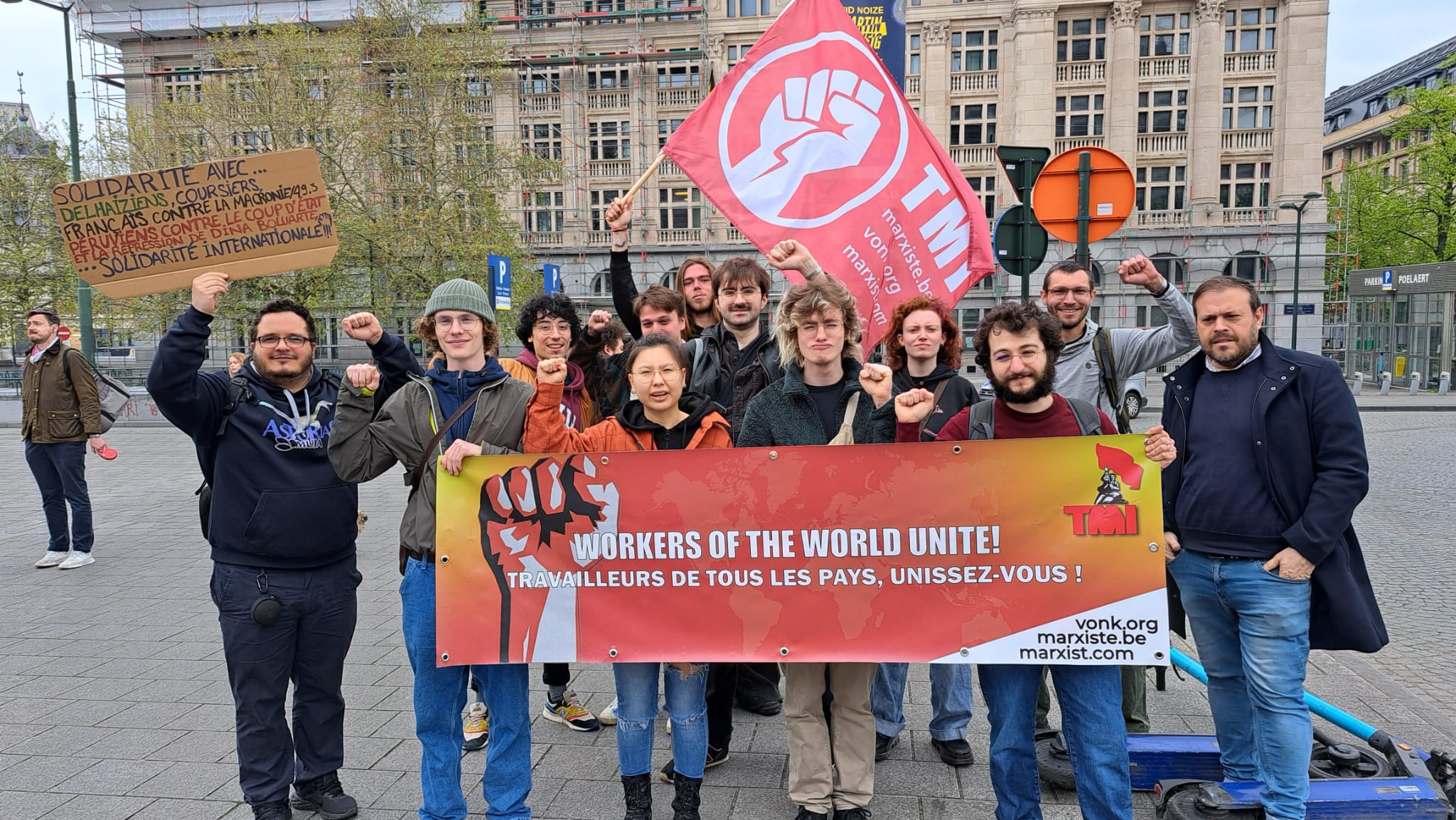
In Belgium, prior to May Day, there had been no attempt by the trade unions or the left to mobilise. This, despite the ongoing struggle at Delhaize – Belgium’s largest supermarket chain – that could (and should!) have been a rallying point.
The various political parties involved in 1 May demonstrations focussed on promoting themselves in advance of the elections in Belgium next year. Connor Rousseau, chairman of the so-called Socialist party, emphasised in his speech the need to get the unemployed back into work. Meanwhile, the PVDA/PTB, the most left-wing party in parliament, rallied around the slogan “tax the rich”, showing the reformist trajectory of that party.
This once again shows the need for a Marxist organisation that can bring out the militant traditions of 1 May.
Brazil
In Brazil, the CUT and other trade unions practically gave up calling May Day demonstrations, and instead organised celebrations, commemorations or charitable events.
Some even had the backing of the government and the employers’ organisations, as in Rio de Janeiro. For this reason, we decided to participate in a parallel event in the city, organised by the Oil Workers’ Trade Union and other unions.
In São Paulo, an enormous stage was set up for union leaders and President Lula himself to speak at. Yet even with his presence and that of other important political leaders, the crowd was one of the thinnest in history.
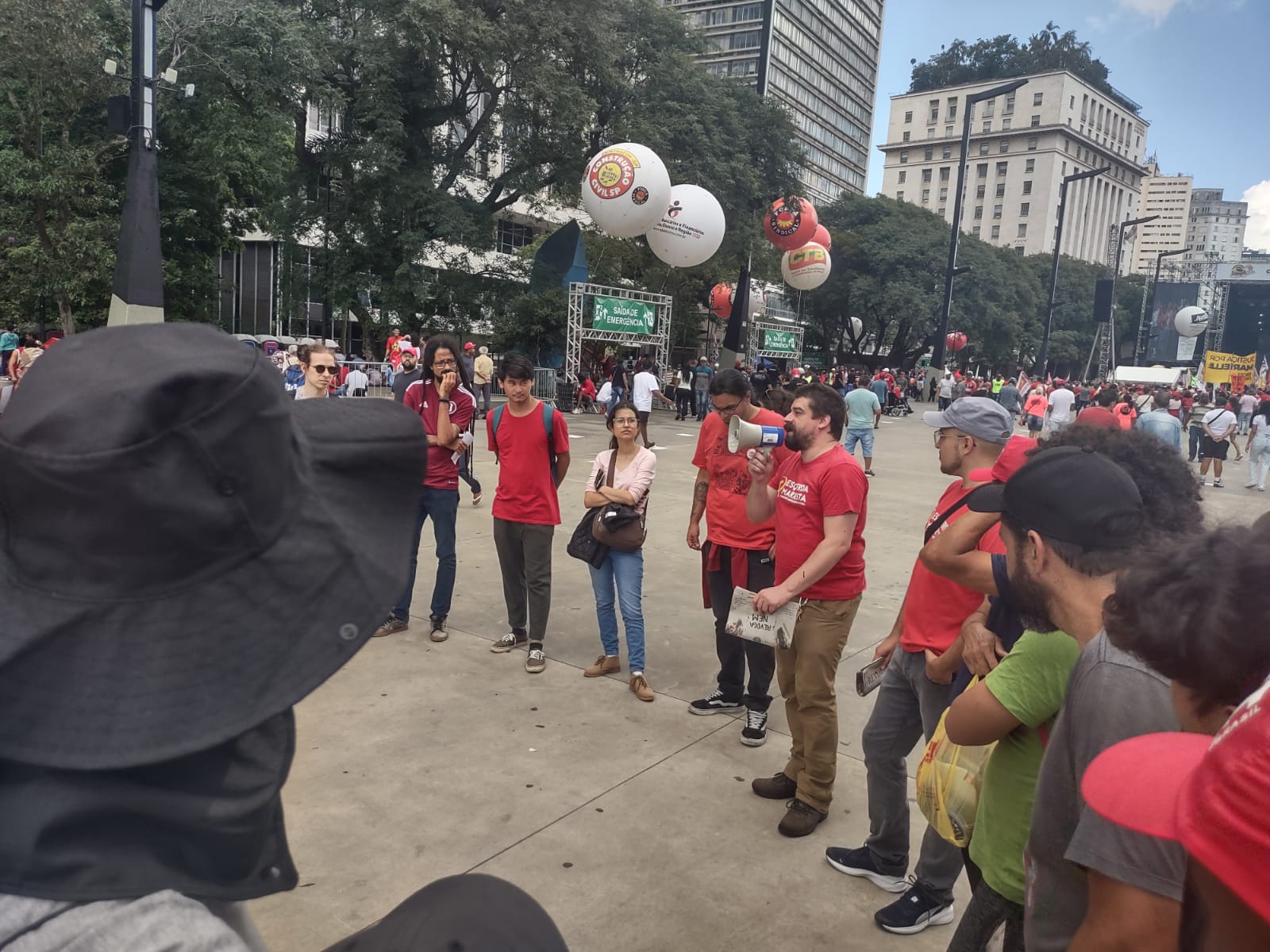
Clearly, the workers are not interested in attending an event simply to applaud Lula’s national unity government that includes representatives of the capitalist class.
In contrast, Esquerda Marxista, the Brazilian section of the IMT, prepared for the day by discussing our own demands with workers and youth. The only way to rescue the original meaning of 1 May is to ensure its independence from the bosses and their state – that is, to put forward a socialist programme of class struggle.
In São Paulo, we formed a revolutionary bloc. This involved railway workers who are struggling against the privatisation of the São Paulo Metropolitan Train Company (CPTM), as well as students and teachers fighting attacks on public and free education, approved by previous governments and which the Lula government refuses to revoke.
In São Paulo and Rio de Janeiro, we took part in demonstrations by distributing a pamphlet that explained the origins and history of 1 May, combating the festival atmosphere and the class conciliationism promoted by the union leaders, including those of the CUT.
We sold dozens of newspapers, collected signatures petitioning for the repeal of the attacks on education, and met many people interested in joining our organisation.
Britain
While Britain does not have a particularly strong May Day tradition, and the events held can be quite small, that didn’t dampen the revolutionary élan of the comrades of Socialist Appeal when it came to our interventions.
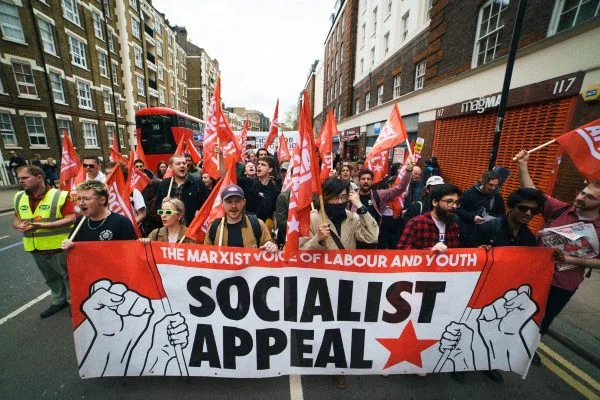
This year’s May Day was book-ended by two national strikes of nurses and teachers, reflecting the reemergence of the British labour movement as a force. As such, and to connect with the reported 1 in 3 young people who consider themselves communists, Socialist Appeal made a serious move to mobilise.
Comrades either took part in marches or attended May Day events in Falmouth, Portsmouth, Southampton and Bristol in the south of the country; Ipswich in East Anglia; Leicester and Cardiff in the Midlands and Wales respectively; Sheffield and Leeds in Yorkshire; Newcastle in the North East, and Glasgow in Scotland.
Everywhere we were out, the British section of the IMT flew the red flag for Marxism proudly. In London, where the largest May Day march is usually held, Socialist Appeal easily had the most impressive bloc.
Over 100 comrades and contacts marched together through the capital city, waving flags and shouting slogans, and proudly carrying two large banners that announced, “Fight for revolution! Join the Marxists!”
As a result, our youth and enthusiasm attracted other May Day marchers to our side, and by the time we reached Trafalgar Square for the closing rally, our bloc had grown.
Wherever we were, the IMT distinguished itself by the boldness of our speeches and chants. Speeches were given by comrades at rallies in other locations, including Ipswich and Southampton. In Newcastle and Leeds, our blocs led a number of chants amongst the attendees and stood out for their fighting spirit. Young people in particular were drawn in, keen to speak about communism and sign up.
The enthusiasm with which we were received was reflected in the numbers of papers sold. In total, over 215 copies of the Socialist Appeal found their way into the hands of people interested in learning more about us, with over 40 of those agreeing to find out more about getting involved. In addition, we sold around £650 of material in the form of books, pamphlets and merchandise.
Despite the fact that some of the strikes in the strike wave that has swept Britain have begun to fizzle out, more are clearly beginning to emerge – particularly in local government and the education sector. The mood for revolutionary change is clearly growing. This is the mood we are trying to tap into, and if May Day was any sign then we are beginning to do exactly that – and in greater numbers than we ever have before.
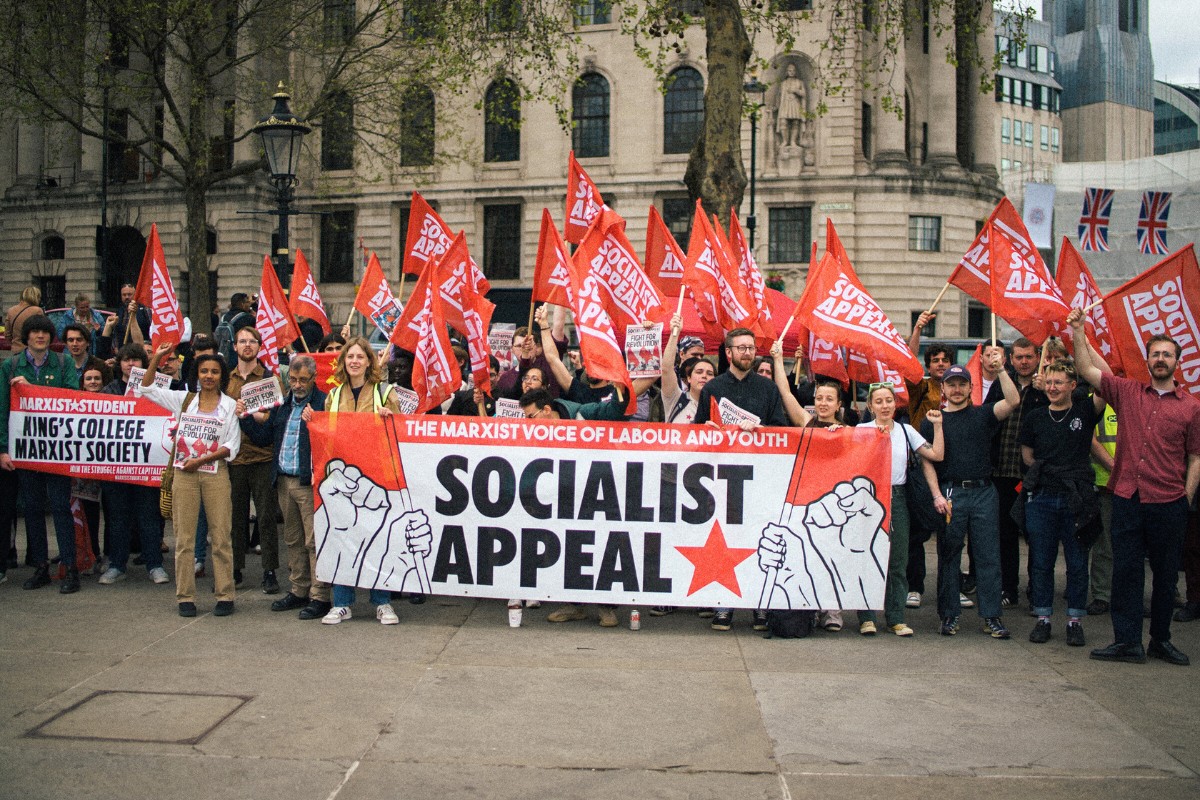
Perhaps May Day is not a great tradition in the British labour movement generally, but it is certainly becoming a great tradition for Socialist Appeal and the IMT. This is only one step towards our goal of reaching 1,000 members by the end of the year, but every comrade that took part would agree that goal is clearly well within reach – and we have the determination and the enthusiasm to reach it.
Long live International Workers’ Day! Long live the IMT!
Canada
May Day in Canada fell immediately after the conclusion of a strike of over 150,000 federal government workers. This is just a few months after a strike of 55,000 workers in Ontario defied “back to work” legislation, humiliating the right-wing government in the province. The federal worker strike was the largest in Canada in a generation, and shows that the class struggle is beginning to pick up. Comrades from Fightback, the Canadian section of the IMT, intervened enthusiastically in this strike and at May Day demonstrations, which blended together in some cities.
Fightback was present in May Day demonstrations in Vancouver, Edmonton, Toronto, Hamilton and Montreal. Everywhere we went, we found a thirst for ideas. Across the country, we sold just under 100 issues of our fortnightly paper, as well as signing up 10 new subscriptions. While people are clearly looking for ideas, they are also looking for a route to change society, as at least 60 people have told us they want to get involved, and help us bring down capitalism. While these numbers may not be massive, it’s worth remembering that most cities in Canada, like the United States, do not have a strong May Day tradition, if there is a tradition at all.
In an effort to combat this, in Toronto, we held an event the day before on the history and significance of May Day. Fightback activist Adam gave a speech on the topic which was very well received by the over 110 attendees. We also took the opportunity to produce a video in solidarity with striking government workers. That same day in Montreal, we held an event which attracted 55, and featured a speech by a rank-and-file government worker on strike.
On May Day, most people learned about the deal the federal government workers were recommended to accept by their union leadership. The deal fell well short of what the workers were demanding, and scandalously leaves the Canadian Revenue Agency (CRA, tax administration) workers out, meaning they are still on strike without a contract, and the majority are being told to cross their picket line and go back to work.
Thankfully, a sizable portion are furious about this, arguing that it “makes no sense that we get to go back to work and leave CRA to stand alone. What about solidarity!?” As the class struggle continues to heat up, we see the need to revive the revolutionary traditions of May Day. Many workers are learning that solidarity, class struggle, and militant Marxist politics and tactics are necessary in order to win.
Chile
In Santiago there are two May Day marches. One is the ‘official’ demonstration, organised by the CUT, the country’s main trade union, and the other an alternative, class-based, militant demonstration. This year, the official march of the CUT was also the official march of the coalition government of the Frente Amplio and the Communist Party, which is moving more and more to the right, and which has adopted repressive policies against the masses.
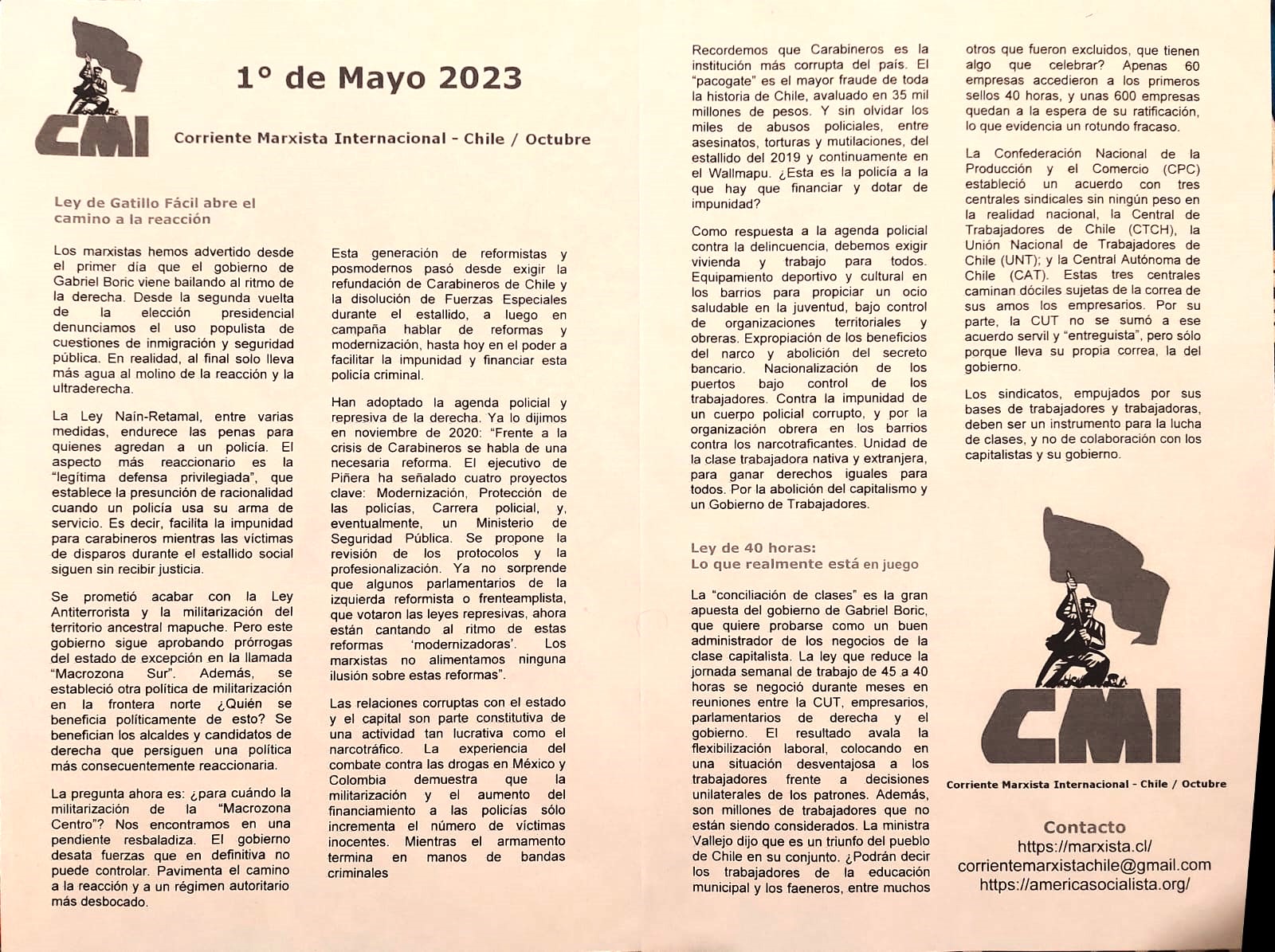
Two comrades in Santiago decided to focus on attending the militant alternative march together, which attracted some 5,000 attendees. We printed 100 two-page leaflets with our analysis of the government’s policy and the law to reduce working hours. We managed to distribute 50 leaflets, which young people and workers read avidly. At the end of the march (which was repressed by the police), one of the comrades then went to the official event organised by the CUT and the government, which was left undisturbed by the police, with between 7,000 and 8,000 people in attendance, where the remaining leaflets were distributed.
Colombia
May Day marches in Colombia have not been well attended in recent years. However, it is clear that the election of Petro to the presidency last year – a direct consequence of the 2021 National Strike – has enormously motivated the masses to take to the streets. More than 19 cities saw mobilisations from various trade unions and revolutionary organisations, reflecting the fact that the masses are seriously pressing their demands for agrarian, labour and healthcare reforms. Far from being discussed merely in Congress, these questions are cause for discussion and mass mobilisation in the streets.
Three comrades from Colombia Marxista hit the streets in two cities (Bucaramanga and Bogotá) to sell our newspaper Colombia Marxista and also copies of the Spanish-language theoretical journal of the IMT, América Socialista. In Bogotá, two comrades joined a demonstration along the Carrera Séptima and then followed the march to the Plaza de Bolívar.
In Bogotá, 20 copies of Colombia Marxista and three copies of América Socialista were sold and five people expressed an interest in joining. This could form the starting point for establishing a solid group in the capital. In Bucaramanga, six copies of Colombia Marxista were sold.
We expect further marches to defend the reforms the masses are fighting for, and to challenge those senators that represent the interests of the oligarchy. While Petro is pursuing a policy of class conciliation, the rank and file of his party recognise that the oligarchy represents the biggest obstacle to any reform. Indeed, during the demonstrations, a large banner with the slogan, “no more conciliation,” was hung at the entrance to the House of Representatives.
Colombia is currently experiencing its first reformist government. As this is the product of a great social explosion that temporarily put the oligarchy in check, the expectations of the rank and file are high. But their patience with reformism is proving to be short.The exposure of the weaknesses and limits of reformism will create a big audience of Marxist ideas, that offer the only real solution to the monopolisation of healthcare, low wages and the high cost of living, which define life in Colombia.
Czechoslovakia
The Czechoslovak group of the IMT made its biggest splash ever at this year’s May Day event, with two teams participating in the gatherings of the Communist Party (KSČM) in Prague and Brno. At those gatherings, our mostly young comrades received a friendly reception, resulting in a record distribution of our materials, especially of the latest issue of our magazine, ‘Avantgarda’.
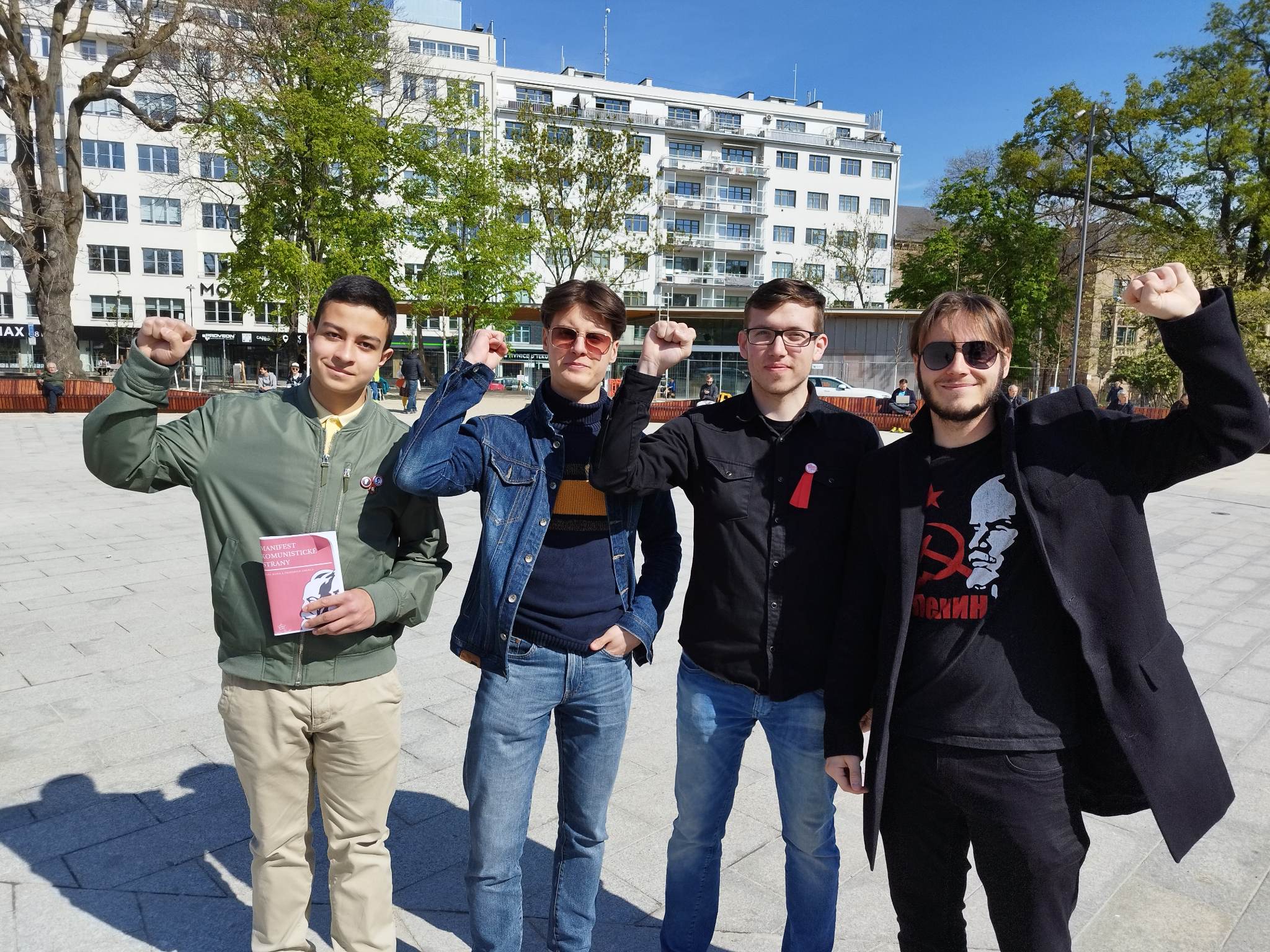
In Brno, our comrades were invited from the stage by the KSČM organisers to speak at the event. For many new comrades, this was a great chance to get into discussions and sharpen our arguments for Marxist ideas. After the event in Brno, we also organised a discussion on the topic of ‘Marxism and the state’.
KSČM has begun losing touch with the working class, and especially with the youth. This is reflected in the fact that the vast majority of those attending May Day gatherings tend to be pensioners, and numbers have dwindled. As the whole left is in a phase of total collapse both in Czechia and Slovakia, no alternative May Day events are being organised either.
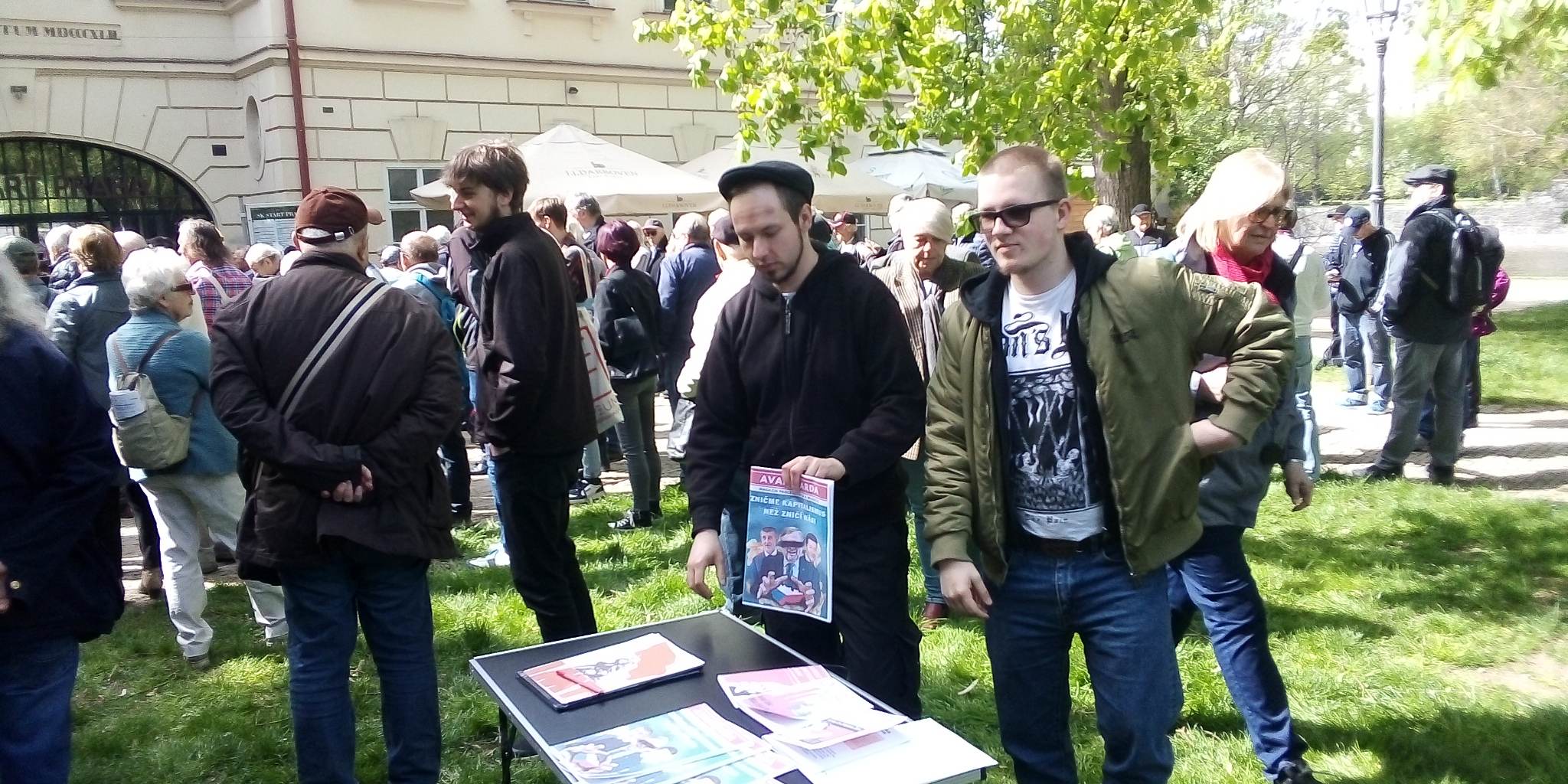
As numbers dwindle, reactionary elements have become more emboldened to turn up to KSČM gatherings, to smear and intimidate those in attendance, calling for the banning of Marxism and of the Communist Party itself. This year was no different.
But this doesn’t mean that things cannot be turned around. If the present leadership of the workers’ organisations has succeeded in dissipating the support of workers and students, then our task is to win them back. 1 May is also a day of cultural events among students, in which we can intervene and revive the revolutionary traditions of International Workers’ Day in the future.
Denmark
Revolutionære Socialister (RS), the Danish section of the IMT, had a very successful May Day. In Copenhagen, International Workers’ Day is celebrated in a large park, and organised by the trade unions and the left. We had our own event in the park, titled, “Revolutionary May Day – for class struggle and socialism”.
Our bold, political approach attracted several hundred people throughout the day, in particular young people.
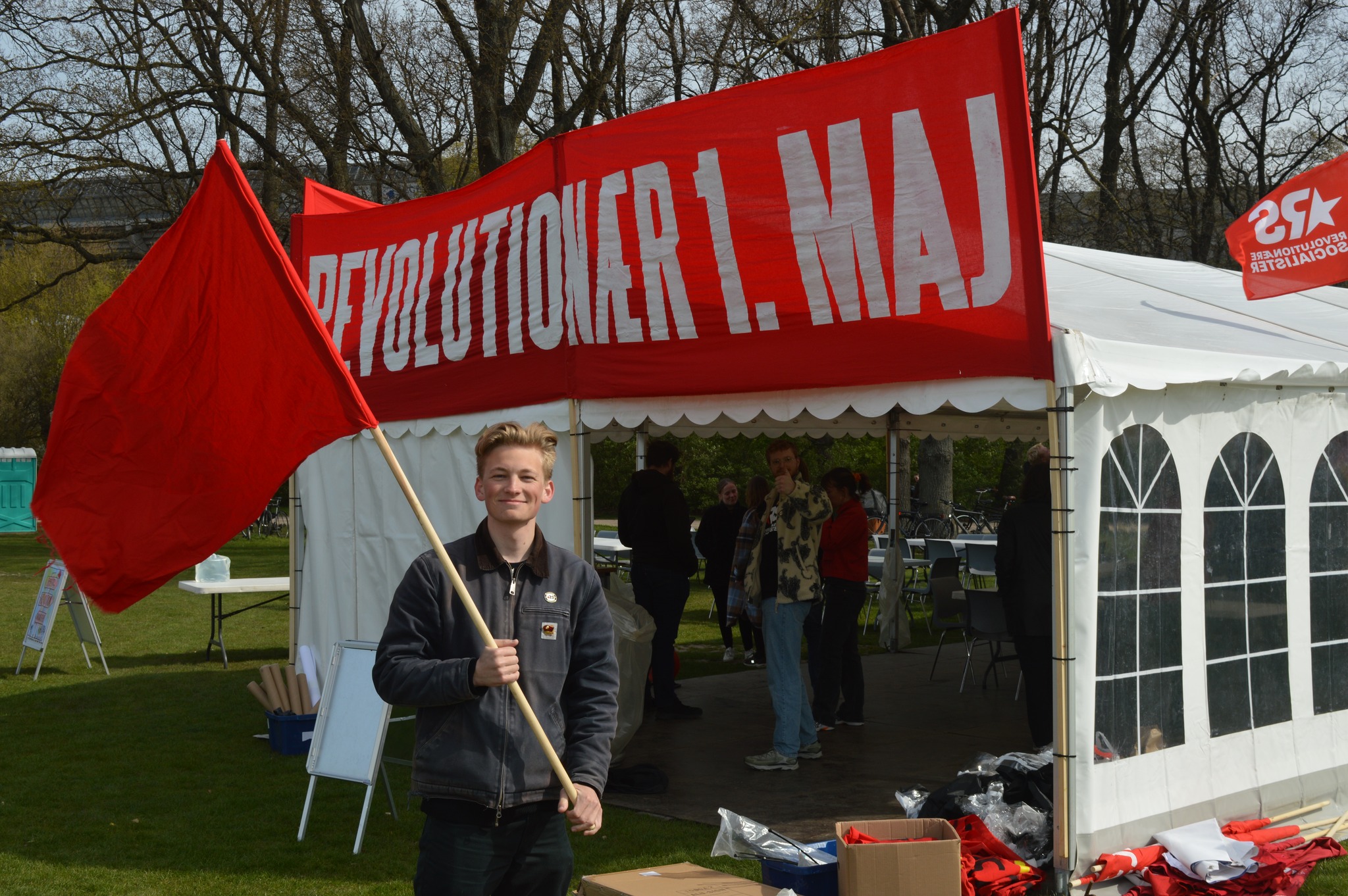
Other organisations have made May Day a day of beer drinking, sausage eating and an opportunity to sell merchandise. We, on the contrary, focused on the political content of the day, with speakers, literature stalls, our newspaper, and the revolutionary slogans we held aloft on our banners and flags. We sold lots of books, pamphlets and newspapers, and met a large number of radical young people looking to join RS.
We had a similar experience in Aarhus, Denmark’s second biggest city, where we have now established a branch. Despite being a group of very new comrades, we had an extremely successful 1 May. We sold out of our newspapers, as well as almost all the books and pamphlets we had. We collected a number of contact details of people interested in joining the struggle.
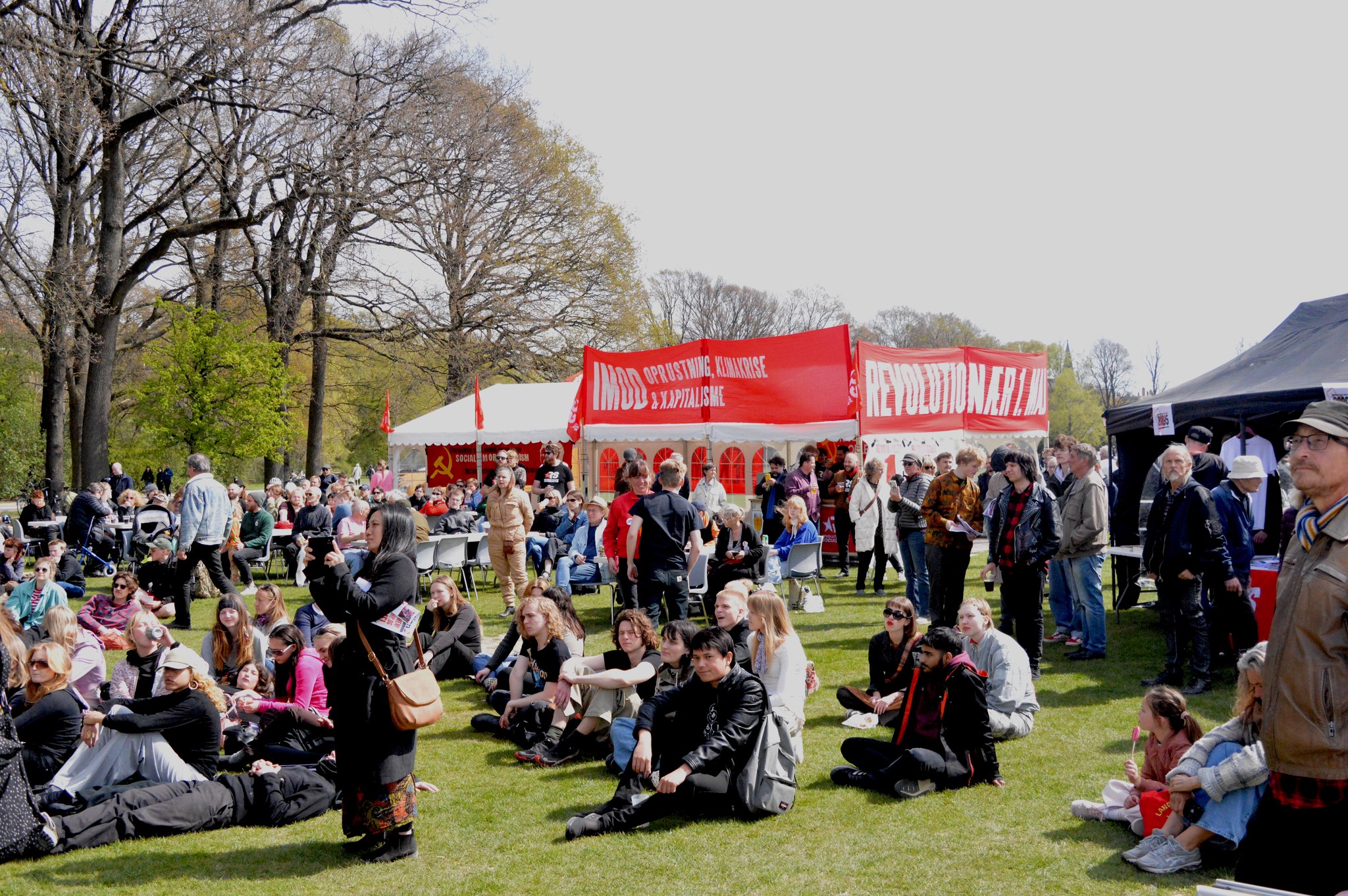
All in all, this was a fantastic 1 May for the Marxist tendency, bringing home the immense potential for revolutionary ideas among young people in Denmark.
El Salvador
Comrades of the IMT in El Salvador took part in the traditional 1 May demonstration, which this year involved around 50,000 people. The event brought together trade unionists, rank and file members of the FMLN party, community organisations and the organisation of relatives of the innocent prisoners of the regime, a movement which has developed as a result of the repressive policy of the Bukele government against the gangs.
Also noteworthy was the participation of call centre workers, a highly exploited and atomised sector. These workers organised a campaign, #Mayo1NoMeLogueo, for several weeks prior to 1 May, urging colleagues not to show up for work, demanding a wage increase and better working conditions. This campaign has been an inspiration across the sector. It is the expression of enormous discontent, which is looking for a way to express itself. We will report on this situation as it develops, and fight alongside these workers in their future struggles.
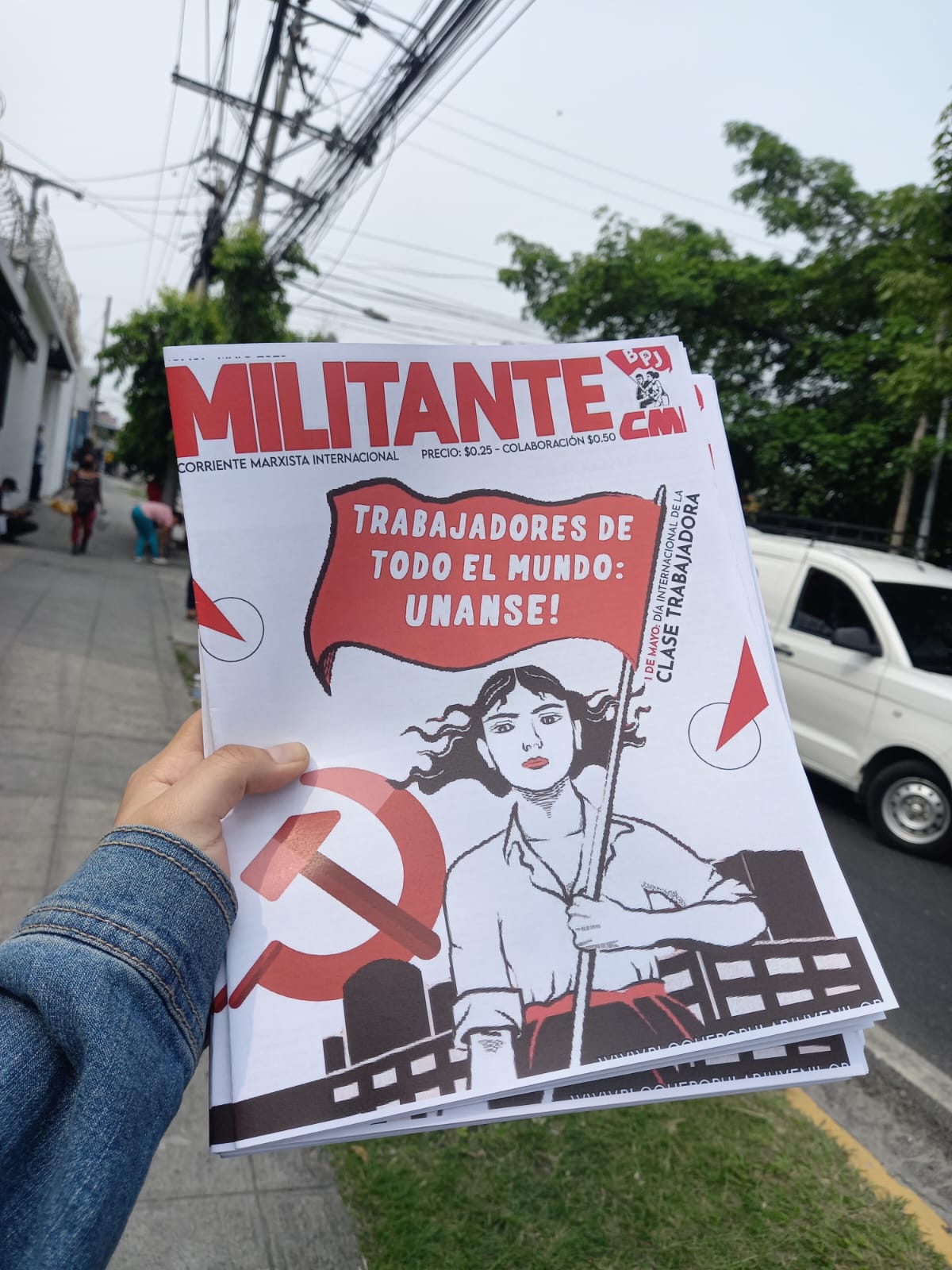
In the weeks leading up to 1 May, we set ourselves the target of selling 400 copies of the IMT’s newspaper in El Salvador, $100 of books and leaflets, and to sign up new comrades to the organisation. In the end we were extremely successful, selling 441 newspapers, raising $94 from our other material. All our comrades were very encouraged by this result. For some it was their first time putting forward the ideas of Marxism while selling our material on a demonstration. The immense achievements of these comrades can be seen in the results of the sales.
Another important aspect of our sale at the 1 May demonstration was that this was the first edition of our newspaper produced using our own printer. The quality of the paper is superior to private printing, the costs have been reduced by 50 percent, and in the next issue we will be able to add an additional page. This has been a very important step towards the building of a Marxist publishing house in El Salvador.
Finland
The International Marxist Tendency made its second ever intervention in the traditional May Day rally in Helsinki, Finland this year. It is clear that there exists a huge thirst for the ideas of authentic Marxism in this country, where the revolutionary left has long been dominated by Stalinist outfits and ultra-left sectarian groups.
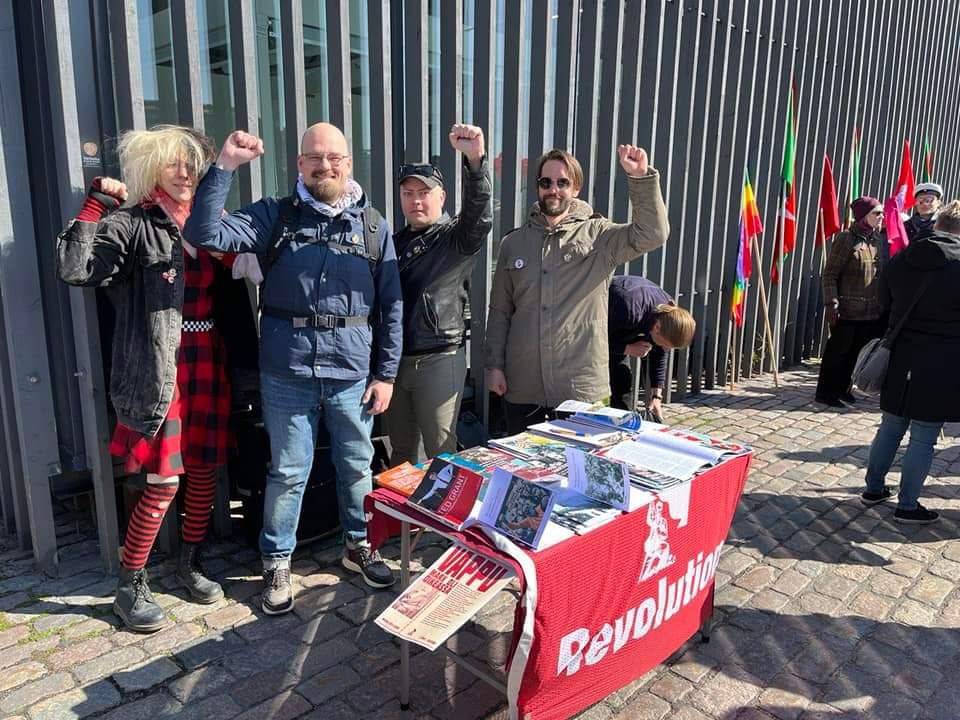
The organisers of the rally were not only reformist, but openly reactionary. The speech by outgoing social democratic Prime Minister Sanna Marin, solely demanded increased military support for the Ukrainian regime. “Ukraine must win the war!” she screamed.
Meanwhile, we, the Marxists, took part in the anti-NATO component of the march, making for our most successful May Day intervention in Finland ever. We now have a handful of dedicated members in the country, and are in a better position than ever to build a Finnish section of the IMT. The total betrayal of the reformists, and the pessimism of the rest of the left, is blatantly obvious to all radical workers and youth in Finland. This was very much reflected in the reception we received.
We sold 27 issues of our Finnish-language theoretical journal, and 25 pamphlets, as well as two books. There was a queue at our stall all day. We talked with a multitude of people interested in getting active in a Marxist organisation, and are now looking forward to taking our work to the next level.
We also held a very successful public meeting on the topic ‘Marx was right’ after the demonstration. Next year, as a step towards building a Finnish section of the IMT, we plan to launch a quarterly Finnish newspaper.
France
In France, the May Day demonstrations were presented by the trade union leadership as a 13th ‘day of action’ against Macron’s pension reform. Consequently, the mood was very combative and the turnout was massive, much larger than has become the usual for May Day. More than two million people came out in the streets.
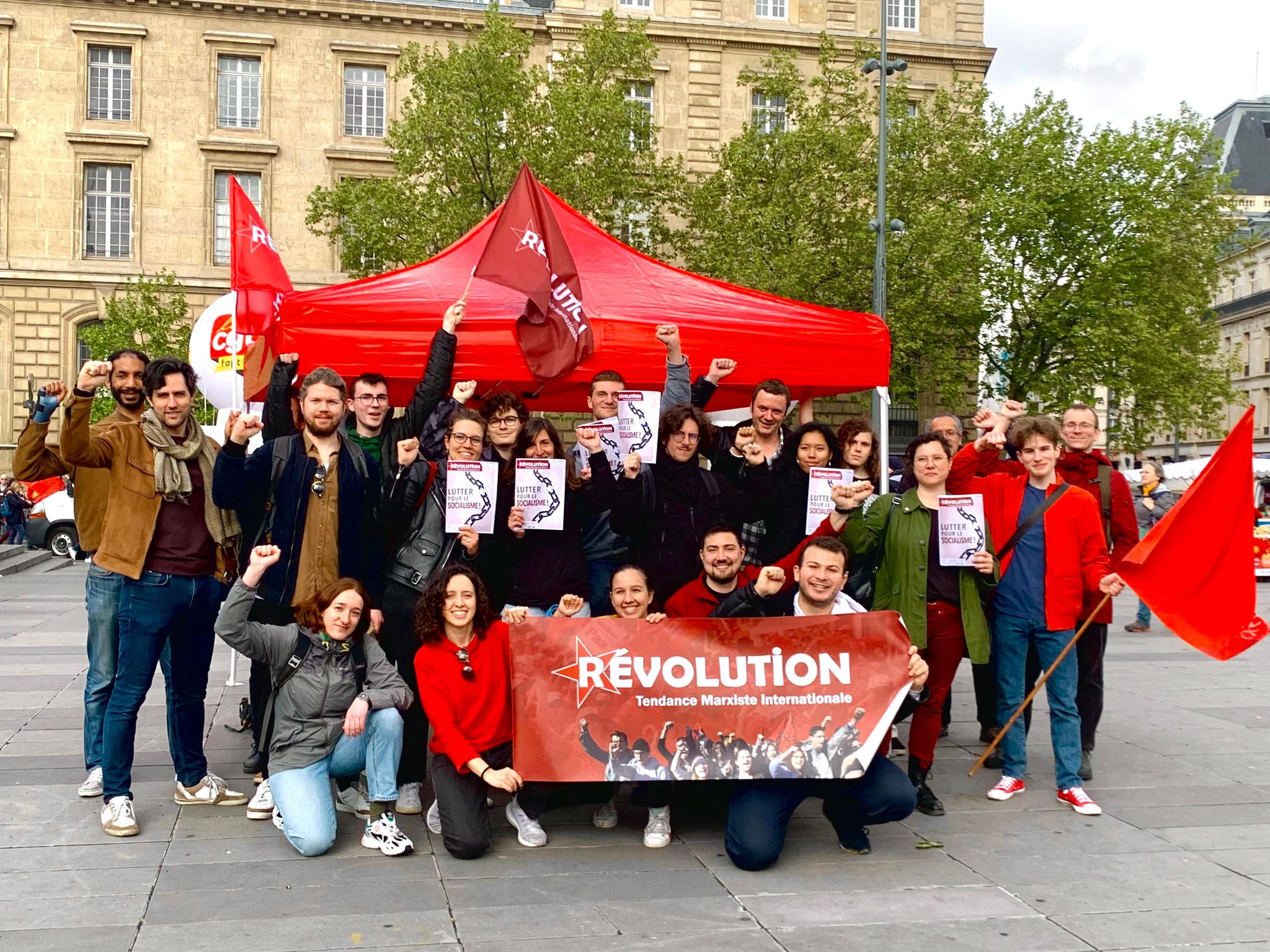
Nevertheless, the leadership of the trade unions have failed to indicate a way forward for the mobilisations. The new head of the CGT is trying to divert the movement toward the parliamentary front, focussing attention on the unlikely prospect of having a referendum on the pension reform approved by the National Assembly.
Since the beginning of the movement in January, new layers have entered into action and a wave of radicalisation has swept through the unions and the youth. The coming period will not allow a quiet and easy for the French bourgeoisie. Its political crisis will continue to unfold, alongside the wider crisis of French capitalism.
As for our intervention, our comrades attended demonstrations in eight cities and towns: Brest, Paris, Lyon, Grenoble, Toulouse, Foix, Montpellier and Marseille. In spite of the bad weather in some cities, the comrades were enthusiastic. We sold a total of 436 copies of our paper, and also a large number of pamphlets and books.
Greece
This year’s May Day rallies were rather small in Greece. Since the leadership of the mass parties of the working class and the trade unions refused to organise and escalate the recent mass movement of the youth in March, the workers and the youth didn’t see a reason to participate in a rally just to hear bureaucrats deliver routine speeches.
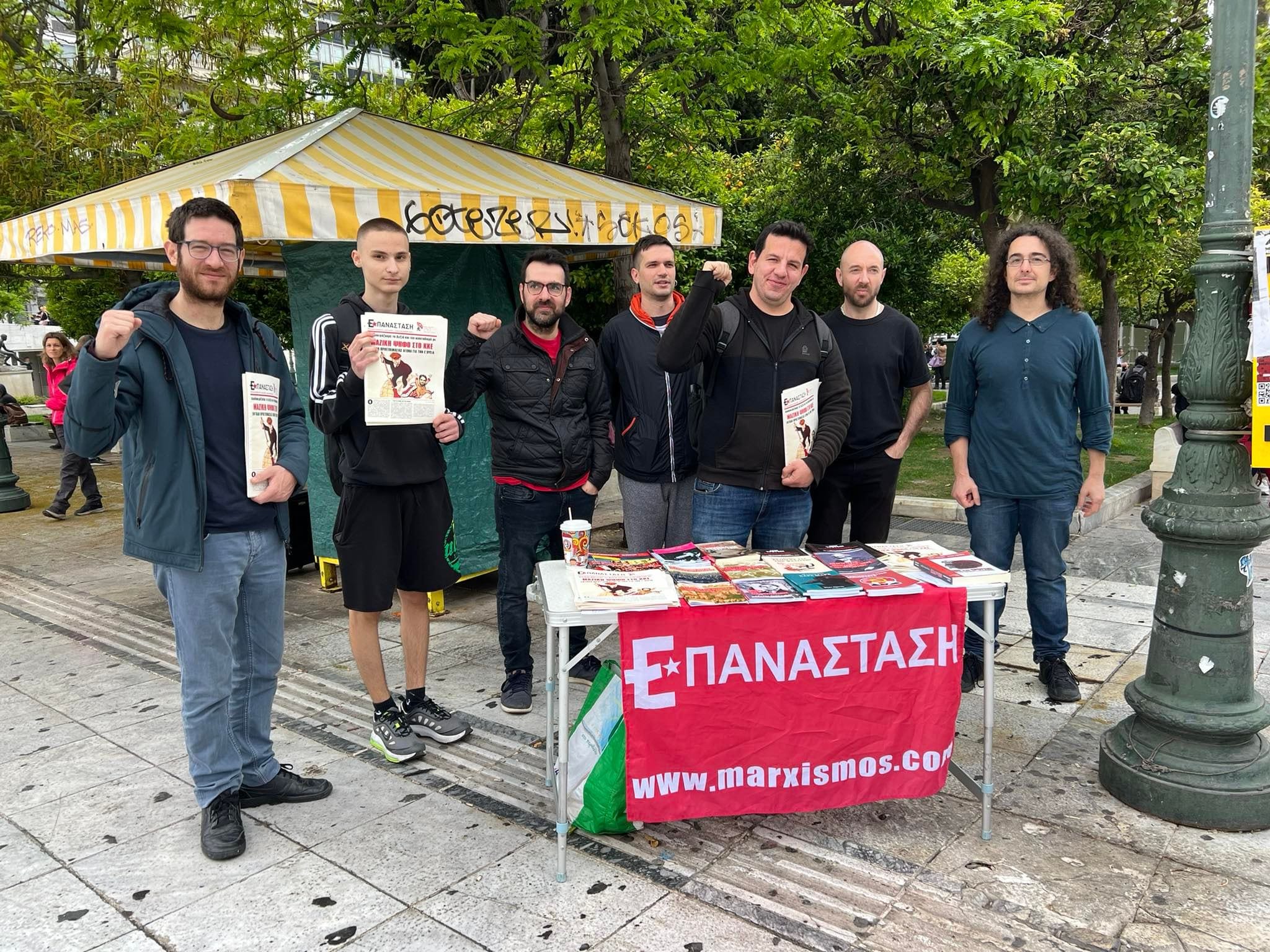
For this reason, the youth was almost wholly absent. The youth and the workers in Greece are now turning their attention to the political field, in order to get rid of the right-wing government in the legislative election on 21 May. Despite the small rallies and poor weather, 13 comrades of the IMT in Greece intervened in rallies in Athens, Patras and Tripoli, sold 32 papers, and collected €52 for our fighting fund.
Germany
The unions of the German Trade Union Confederation (DGB) called for demonstrations on this year’s 1 May under the slogan: “Unbroken Solidarity”. Across Germany, almost 300,000 people were on the streets.
Der Funke, the German section of the International Marxist Tendency, participated in more than 12 cities – including Berlin, Hamburg, Marburg, Würzburg, Frankfurt, Nuremberg, Munich, Leipzig, Magdeburg, Bremen, Cologne and Hanover. Comrades attended the demonstrations organised by the DGB, as well as ‘Revolutionary May Day’ events organised by smaller left-wing groups.
In some cities, for example in Hamburg, Marburg, Munich and Berlin, we could be heard loudly chanting revolutionary slogans and singing workers’ songs. We were easily visible with our flags, banners and placards. Our slogans included: “I was, I am, I shall be! The revolution will liberate humanity!”, “The revolution needs you! Fight for socialism!”, “Forward to the general strike”, “Fight for socialism in our lifetime”, “Workers of the world, unite!”, “Peace to the huts, war to the palaces!”
We promoted our ongoing student campaigns and upcoming events, which were met with interest. We sold over 150 copies of the current issue of our paper, entitled “Class Struggle Against Capital and Crisis”, as well as other material such as our international theoretical magazine, books, pamphlets and t-shirts.
The main focus this year was fundraising, to finance our Karl Marx Seminar on 25 and 26 November in Berlin. We were very successful in many cities. In total, we were able to collect €2,473 in donations on 1 May alone.
The seminar will focus on the German Revolution from 1918 to 1923 and the period leading up to the transfer of power to the German fascists in 1933. At that time, the German working class had the chance to overthrow capitalism. The Russian working class led the way in 1917. Together they could have laid the foundations for the world socialist revolution.
In 14 talks followed by discussions, we will learn from the mistakes as well as the successes of these struggles. We will learn about the ideas of Rosa Luxemburg and Karl Liebknecht, discuss the workers’ united front, and clarify why fascism was able to come to power in Germany in 1933.
The seminar aims to inspire a new generation of revolutionaries and class fighters with the revolutionary history of our class as well as with the ideas of Marxism. The youth is becoming particularly politicised today. They should actively participate in the workers’ movement in order to fight for socialism in our lifetime.
Italy
After successful celebrations for the 78th anniversary of Liberation Day, 25 April, celebrating the overthrow of Nazi-Fascist rule, which was mass participation by hundreds of thousands of people, May Day demonstrations in Italy were disrupted by bad weather. Rain and wind swept violently across the country, discouraging workers’ participation in the demonstrations.
Our best public activities took place in Bologna, where we held a stall, which carried traditional carnation flowers, raising €200 for the organisation’s fighting fund and distributing 25 copies of our paper, Rivoluzione.
In Rome we had to call off an open air Red Festival in a park on account of the weather. But we replaced it with an indoor solidarity lunch and meeting, which attracted over 60 people, including around 20 sympathisers and others interested in joining the Marxist tendency. Food and book sales raised almost €700.
In Milan, we participated in trade union demonstrations (one in the morning and another in the afternoon), at which we distributed more than 50 copies of Rivoluzione.
In Varese, our comrades organised a bloc in the traditional trade unions demonstration, with flags, placards and slogans, selling 30 copies of our paper.
In Naples, on top of participating in the traditional demonstrations, we organised an intervention in Potenza, where the unions held their main meeting in the presence of the national leaderships. 38 copies of Rivoluzione sold, despite the pouring rain.
May Day was also marked by another important event. The right-wing government deliberately chose this day, with its symbolism for the working class, to pass a new decree further aggravating the norms on casual employment and other attacks. This was a slap in the face to the trade unions.
The unions called three demonstrations for the following Saturdays: a completely inadequate answer to this latest attack by the government and the bosses. But it is quite clear that the more the government provokes, the more the workers will increase their pressure on the trade union leaders for a real struggle to defend wages and conditions.
Mexico
The International Marxist Tendency in Mexico, La Izquierda Socialista, joined the 1 May demonstrations throughout the country.
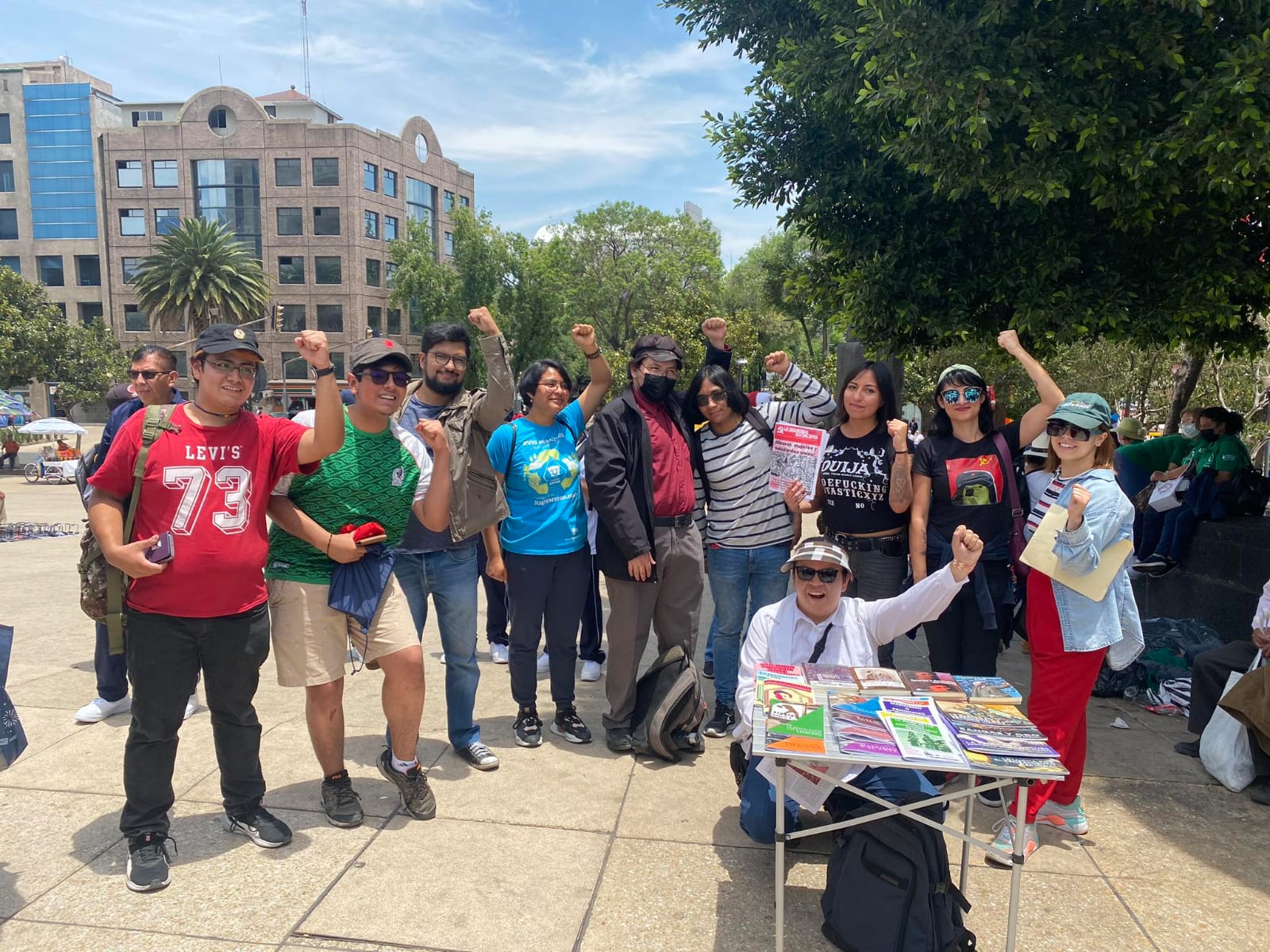
This year the demonstrations were scattered and not as massive as in previous years. This is despite the fact that there are a number of important struggles ongoing in different sectors of the economy, such as that of the workers at two of Mexico’s largest universities.
IMT comrades attended two events: the first, a demonstration by the trade unions of the National Union of Workers (UNT), and another called by the independent unions and those linked to the New Central Workers’ Union (Nueva Central de los Trabajadores). Twenty comrades took part with stalls at three locations. The front page of our newspaper called for the joint struggle of workers, women and youth. In total we sold 49 copies.
We also intervened in three other states: Puebla, Querétaro and in Hermosillo, Sonora, where we sold 20 newspapers.
Netherlands
The Dutch Marxists were present at the national 1 May march, organised by the main trade union federation, FNV. About 1,000 people were present at the FNV march in Amsterdam.
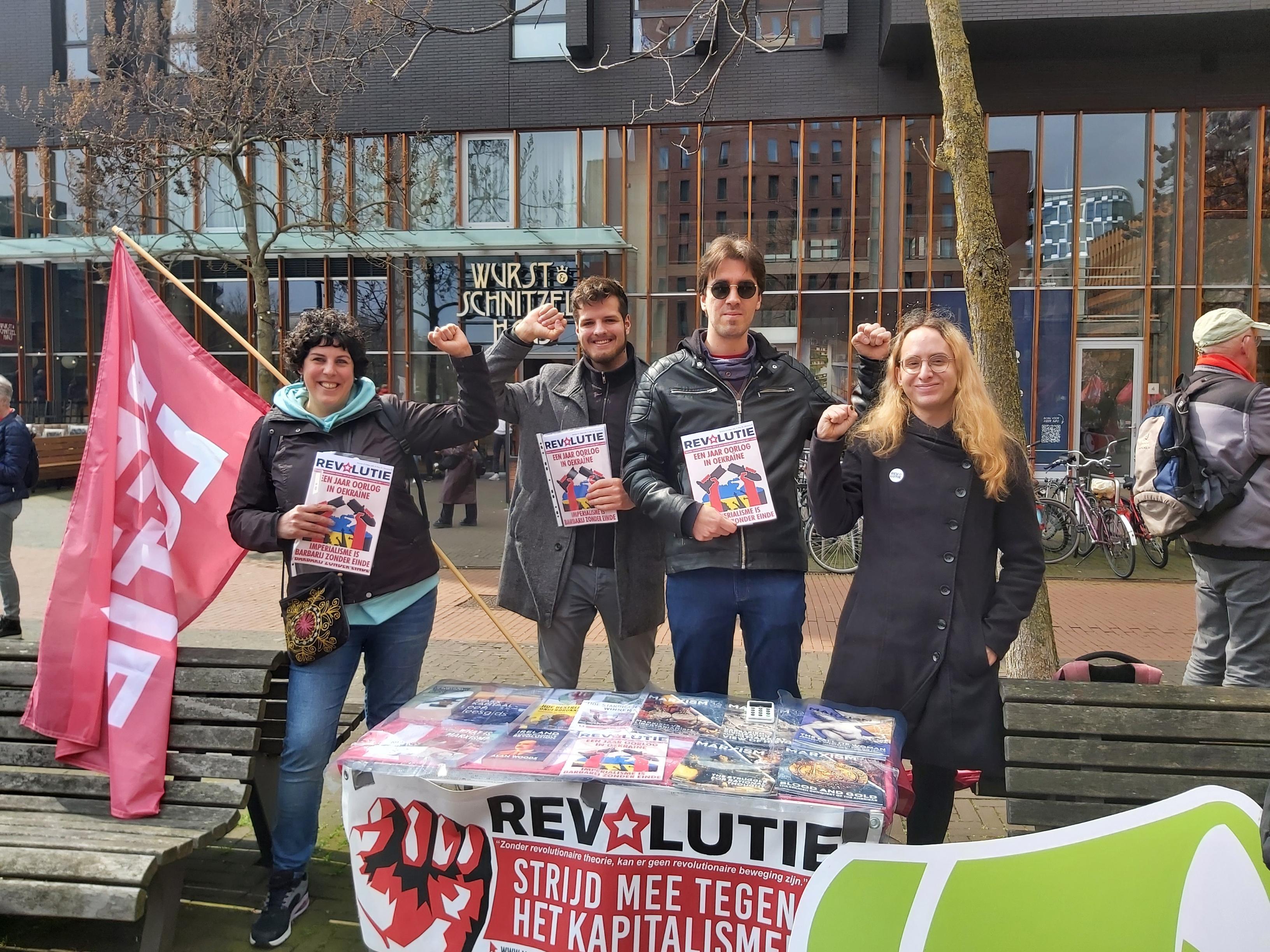
In the Netherlands, May Day is not a holiday, which means a lower turn-out for these demos when 1 May is a weekday. The Dutch labour movement should fight for this day to become a holiday, as it is in many other countries!
In spite of a relatively low turn-out at the demonstration, the class struggle in the Netherlands is on the rise. In the first three months of 2023, the Netherlands saw almost half as many strikes as the total for the whole of 2022. Since last summer, we have seen strikes of airport workers, railway workers, bus drivers, retail workers, municipal refuse workers, and others. Currently there is an ongoing strike at the distribution centres of the country’s biggest supermarket, Albert Heijn. This wave of strikes is no coincidence: last year, inflation in the Netherlands reached 11 percent and the bosses were only willing to concede pay rises in the low single digit percentages. This is leading to a revival of the labour movement after many years of a relative lull.
At the demonstration, four comrades sold 16 issues of Revolutie – the paper of the IMT in the Netherlands – as well as books, brochures and buttons, worth a total of €76.
Nigeria
Nigerian workers joined their counterparts from all over the world to mark May Day, amidst excruciating hardship. This year’s May Day came barely a month after a turbulent and shamefully rigged general election.
As is always the practice, it was jointly organised by the Nigeria Labour Congress (NLC) and Trade Union Congress (TUC). The theme of 2023 May Day was ‘Workers’ Rights And Socio-Economic Justice’. A major demand by workers throughout the country at the May Day event was for an incremental increase in the current N30,000 monthly minimum wage (about $60 when it was introduced in 2019, but now worth only $40). This is obviously no longer commensurate with the current level of inflation, which in January 2023 rose to 21.8 percent.
Members of Campaign for Workers’ and Youth Alternative (CWA), the Nigerian section of International Marxist Tendency (IMT) participated in three centres; Lagos Ibadan and Abuja (the Federal Capital Territory). In all, a total of 119 copies of Workers’ Alternative paper were sold.

In Ibadan, the Oyo state capital, we actively participated in the event at Adamasingba stadium. The turnout among workers was low compared to the previous May Day event. Rank and file workers are gradually becoming more and more detached from a leadership that daily compromises and betrays them. The event was dominated by lamentations by the workers about their severe economic hardship. Many complained that they did not even have transport fare back to their various destinations. It is that bad!
Both speeches by the leadership of the Oyo State NLC and Oyo State TUC eulogised the re-elected governor of the state (Seyi Makinde). Seyi Makinde used the occasion, in the main, to thank the workers for re-electing him for a second term in office and concluded with another round of empty promises.
In Lagos State, an event was held at the Onikan Stadium, and was little different to that in Ibadan. The newly re-elected governor of Lagos State, Babajide Sanwolu’s speech was delivered by his deputy, Babafemi Amzat. Like his Oyo State counterpart, it was dominated by empty promises.
In Abuja, the government initially refused the use of Eagle Square, the traditional venue of the Abuja May Day rally. This refusal was intended to pass on a strong message that the incoming regime remains on a warpath with organised labour. The trade union leadership responded by announcing a street rally through all the major streets in Abuja. This weak and highly unpopular regime could not allow this, and was therefore forced to grant the use of Eagle Square at the last minute.
Very militant and political statements were made by both the Presidents of NLC and TUC, which clearly emphasised the sorry state of things in the country: the terrible state of the economy and the imposition of an unpopular regime on the workers. The demand for a significant increase in minimum wage in response to excruciating galloping inflation echoed loudly through the rally.
Towards the end of the programme, Peter Obi, the presidential candidate of Labour Party at the recently concluded general election made an appearance. From his statement of appreciation, it was obvious he was specially invited by the leadership of the unions. He made a lot of populist statements about the terrible conditions Nigerian workers face, but had no solutions. Indeed, he is part and parcel of the same system whose programmes have successively failed.

It is important to clearly state here that the leadership of trade union centres is treading dangerously when it lines up behind one section of the ruling elite (like Obi) against the other. This contains the danger of splitting the organised unions along ethnic and religious lines, especially when the leadership of the trade union centres coincide with the same region that Obi hails from.
The coming period is certainly going to one of intense struggle between the workers and the ruling class of Nigeria. The latter are hell bent on imposing further hardship on the workers. There is clearly no other alternative that they can pursue under this crisis-ridden system. The incoming regime is not mincing words about increasing the pump price of petrol, thereby worsening already unbearable inflation.
Unfortunately for the ruling elite, they are doing this at a time when the Nigerian workers have already been pushed to the wall. They will be left with no option than to fight back. The labour leadership are going to come under much more pressure from the rank and file in the coming period. Either they provide leadership or they will be thrown out by the workers. We have entered a decisive period in Nigeria: a turbulent period of revolution and counter-revolution.
Pakistan
Pakistan is passing through an economic, social and political crisis that is unprecedented in its 76-year existence. The economy is on the verge of default. Official inflation figures have risen to 47 percent, but in reality it is even higher. The dollar has risen by more than 150 percent against the Pakistani rupee in the past five years. There have been large scale closures of industry in the past year, which have rendered millions of workers jobless.
The ruling class is placing all the burden of the capitalist crisis onto the shoulders of the working class, in accordance with the instructions of the IMF and the World Bank. The people are laden with a huge mountain of indirect taxation. Public subsidies have been drastically reduced and government expenditure on all public utilities has been greatly reduced.
A large portion of the public sector has been privatised and a huge number of workers have been made jobless, due to the subsequent downsizing of these businesses. All the mainstream political parties, the military and the judiciary – despite fighting amongst themselves for a larger piece of the cake – have united behind these attacks on the working class.
These are conditions in which May Day 2023 was celebrated by the workers in Pakistan.
Red Workers Front – the labour organisation of the Pakistan section of the IMT – played a very dynamic role in May Day celebrations across the country. Workers’ protests, rallies, seminars and other events were held under the banner of the RWF. These took place in 21 cities, including: Karachi, Hyderabad, Quetta, Multan, Lahore, Faisalabad, Peshawar, and in far flung areas from Gilgit and Kashmir to war-torn Waziristan.
Workers in the public sector participated in large numbers in the RWF’s events. This included workers in the railway sector, in power plants, education, healthcare, the postal service, ports and many other areas. Workers in the private sector also joined the events, especially those from the factories in the Landhi Korangi industrial areas in Karachi – the largest industrial area in Pakistan.
The main slogans of these labour day events held by RWF were for wage increase in line with inflation, for a ban on privatisation and downsizing, for lifelong employment, and for full freedom for trade union activities. As well as these immediate demands, comrades raised the possibility of a national general strike as the best way forward, gave a Marxist explanation of the capitalist crisis, and discussed the international labour movement and the economic, social and political aspects of a socialist alternative.
The RWF began its preparations for May Day well in advance. Around 5,000 posters were printed and were put up in public sector enterprises and industrial areas all across the country. Study circles and meetings were conducted with the workers from Gilgit in the north, to Karachi in the south. A robust social media campaign was also launched including regular labour reports, programmes aired on Mazdoor TV, and short documentary films.
In all of these activities, the Progressive Youth Alliance (PYA) – the youth front of the Pakistani section of the IMT – also played a very dynamic role. Comrades of the PYA in Lahore prepared a street theatre performance, criticising capitalism, that was much loved by the workers.
The RWF has built a countrywide reputation among the working class through these May Day activities, which we are hopeful will assist in spreading the ideas of Marxism in the labour movement in the period to come.
Forward to socialist victory!
Spain
In total, 33 comrades took part in May Day demonstrations in nine cities across Spain. We sold a total of 56 papers as well as many books, theoretical magazines and pamphlets.
In recent years, the May Day protests in Spain have been small and divided, reflecting the crisis of reformism in the trade unions. On the one hand, the trade union leadership has failed to sufficiently defend workers’ interests, while more radical layers have split off into more combative but smaller trade unions, which organise separate protests in most cities, thus weakening the movement as a whole. There is also a general lack of young people present – the latter typically being drawn to larger protests such as the Women’s March of 8 March; or those in defence of the public healthcare system.
Nevertheless, May Day holds symbolic importance and we have therefore maintained a presence. In the Basque Country, comrades intervened in Vitoria-Gasteiz and Pamplona. The protest in Pamplona was militant and youthful. The final speech emphasised the need for the working class to separate itself from social democracy and the need to build communist parties. We sold papers and copies of the new Spanish translation of Alan Woods’ book, The History of Philosophy: a Marxist Perspective.
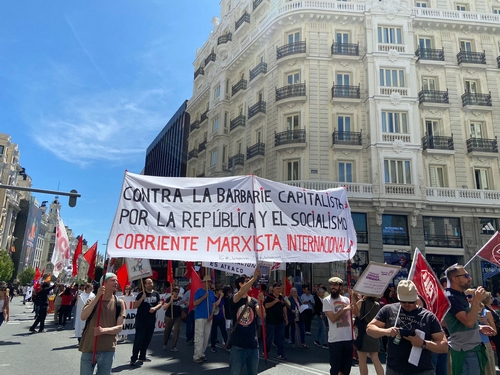
Four comrades participated in a protest of 3,000 people in Barcelona; 10 comrades intervened in a protest of 10,000 organised by the two major national trade unions in Madrid.
Three comrades and a sympathiser intervened in a protest of 1,500 participants in Mallorca, seven comrades intervened at the protest in Málaga, selling 18 papers and making contact with five people who were interested in joining.
Comrades also intervened in Granada, Seville and Zaragoza.
Sweden
There was a notable exception to the muted May Day parades winding through all major Swedish cities: that was the youthful, militant and enthusiastic contingent of the Marxists – armed with papers saying “Communism is back!” and banners with slogans like “Workers revenge – socialist revolution!”
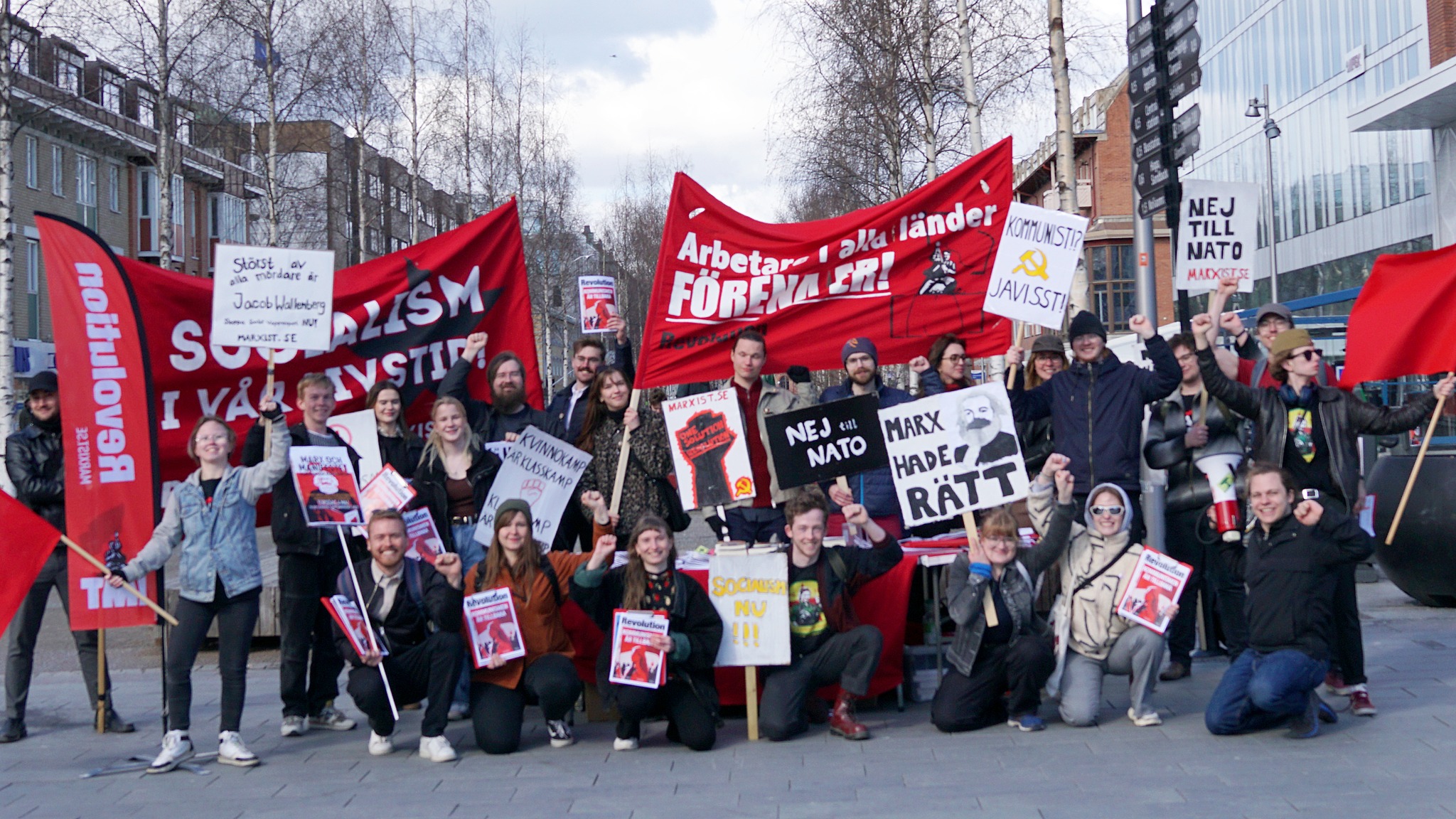
For several years, the 1 May demonstrations of the Left Party in Sweden have exceeded those of the Social Democrats, but it’s also clear that the demonstrations organised by the Left Party are becoming smaller and older. The steady watering down of the party’s demands is turning off radical youth.
Stockholm saw the most sizable demonstration, with around 9,000 gathering. 27 Marxists energetically took part. In the cold Swedish rain, comrades sold more than 270 papers and many books, and met 70 people interested in joining a Marxist organisation. Our vibrant contingent of comrades was even picked up in the liberal paper DN.
In Gothenburg, the Left Party demonstration saw 3,200 participants, with 31 Marxists present. The comrades sold 78 papers, and many more books, pamphlets, etc. and met 32 people interested in getting involved in a Marxist organisation.
In Sweden’s third biggest city, Malmö, the Left Party demonstration was 5,000 strong. Nine comrades and two sympathisers sold 87 papers and met 24 people keen to get active. Again, our unmissable presence was picked up by a local bourgeois paper that complained about how “self-proclaimed communists sold books by Lenin, Trotsky and Marx. And people bought them.” Very true!
In Umeå one in ten people present at the 1,000-strong protest bought our communist paper, and 23 people expressed an interest in getting involved.
Comrades also took part in demonstrations in a host of smaller cities, where the IMT is spreading fast. In Karlstad, seven comrades sold 13 papers at the small Left Party demonstration. In Halmstad, three comrades sold 11 papers plus books and pamphlets, and met two people keen to join a Marxist organisation. Our comrades also intervened in Helsingborg, Borås, and Sundsvall.
All in all, over 100 members of the Marxist tendency intervened in May Day events across Sweden and really stood out. The results speak for themselves: 586 papers were sold, 164 people expressed an interest in joining the International Marxist Tendency and the comrades in Sweden received at least two honourable mentions in the rabid bourgeois press. The forces of Marxism are on the march!
Switzerland
Since our national conference last week, the Swiss section of the IMT has been brimming with revolutionary energy. The comrades were eager to put this into practice on May Day, with around 130 Marxists intervening in six cities – Zurich, Geneva, Lausanne, Berne, Basel, Weinfelden and St. Gallen. The slogan on our paper and our banners was “Socialism in our lifetime”.
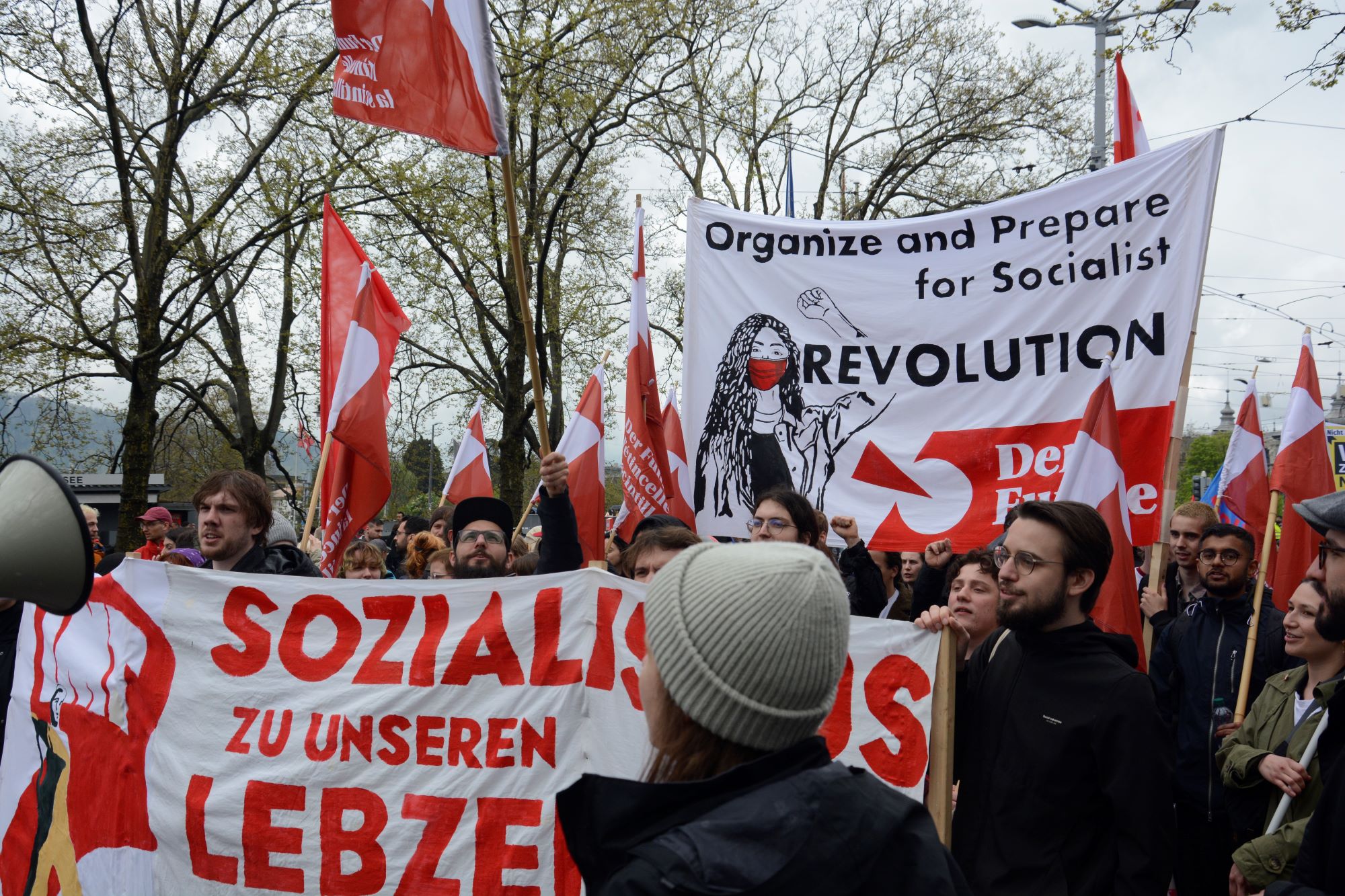
Young people are looking for an organisation with clear ideas that is committed to the struggle for revolution. Our bloc in Zurich – involving 60 comrades – was a particular point of attraction, due to its enthusiasm, militant chants and short political speeches. A young IT apprentice, for instance, joined our bloc at the beginning of the demonstration, stayed throughout, continued discussing with comrades for two hours, and will now join one of our study circles! Similarly, in the other cities, we stood out as most active and determined organisation on the left.
The optimism and militancy of our youth starkly contrasted with the pessimism of the leadership of the reformist organisations. The potential for militant mass demonstrations is huge. In the midst of the deepest cost-of-living crisis in 40 years, the working class in Switzerland is once again having to pay for a bank bailout. Demands, such as those we were raising, like “Wages up, profits down! Expropriate banks, expand welfare!” could mobilise broad sections of the working class. Instead, less than 2,000 people came to the demonstrations in all cities except Zurich, where 10,000 took part.
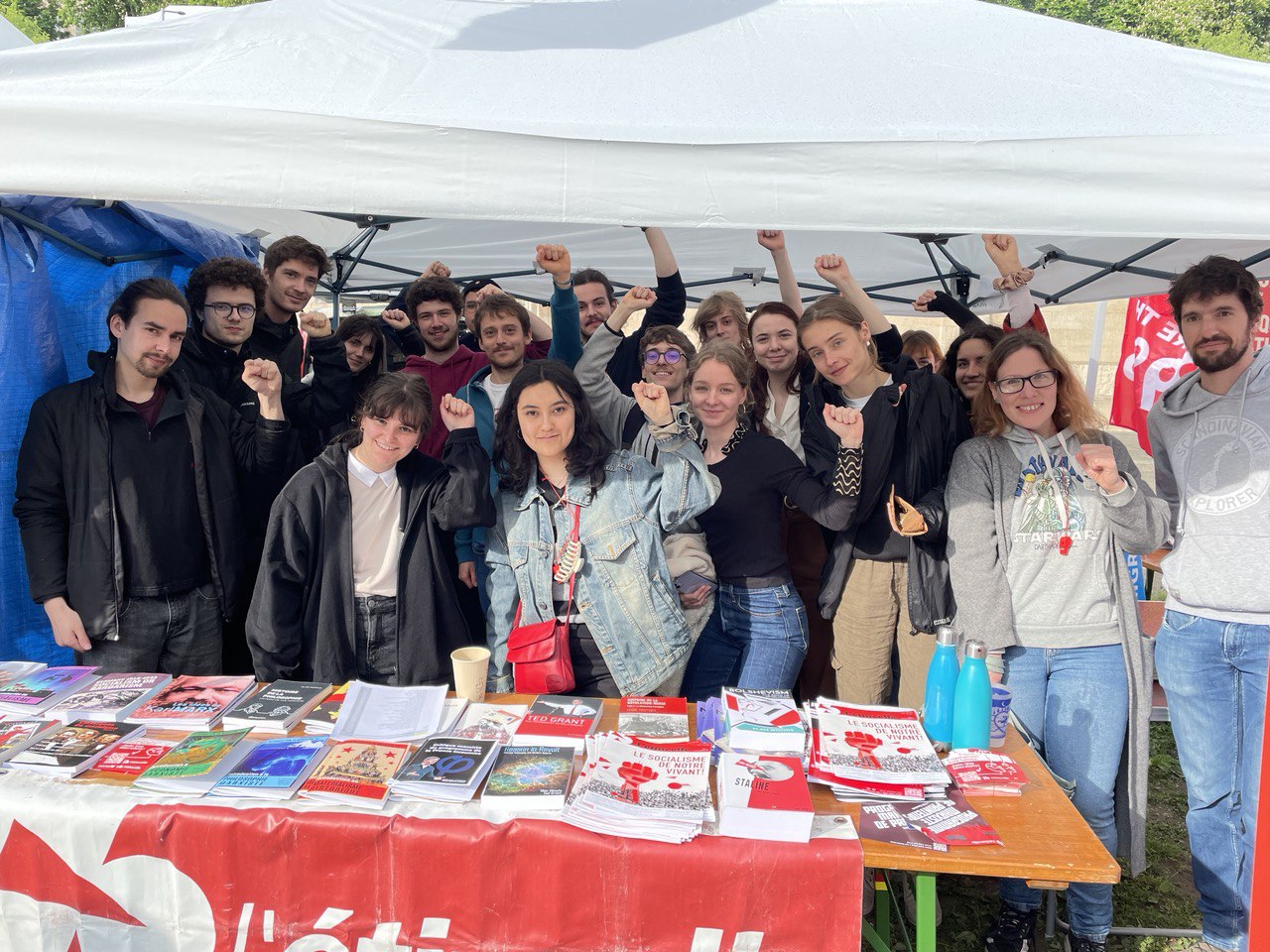
Instead of showing a way out of the crisis, in Geneva the leaders of the Socialist Party (SP) used their platform to bemoan the recent “shift to the right” in the local elections. In Basel, the SP leadership campaigned before May Day for more “police protection against violence at demonstrations” and then removed themselves from the demonstration when the police wanted to break it up. Elsewhere, trade union leaders bored protesters by focusing on the election in autumn.
Despite the pouring rain and the historically weak mobilisation by the reformist leadership, our intervention was a huge success. We hit our target for every comrade to find one person interested in joining a Marxist organisation. In total, we were able to gather 126 promising sign-ups. We were also able to sell 430 copies of our paper. While capitalism and reformism are in a dead-end, the ideas of Marxism are finding an ever-greater echo. Forward to 500 Marxists in Switzerland!
United States
This year’s May Day coincides with a rise in labour militancy across the US. Unionisation drives and strike action are picking up steam after a historic lull in the class struggle, with the entry of energetic young layers breathing new life into the workers’ movement.
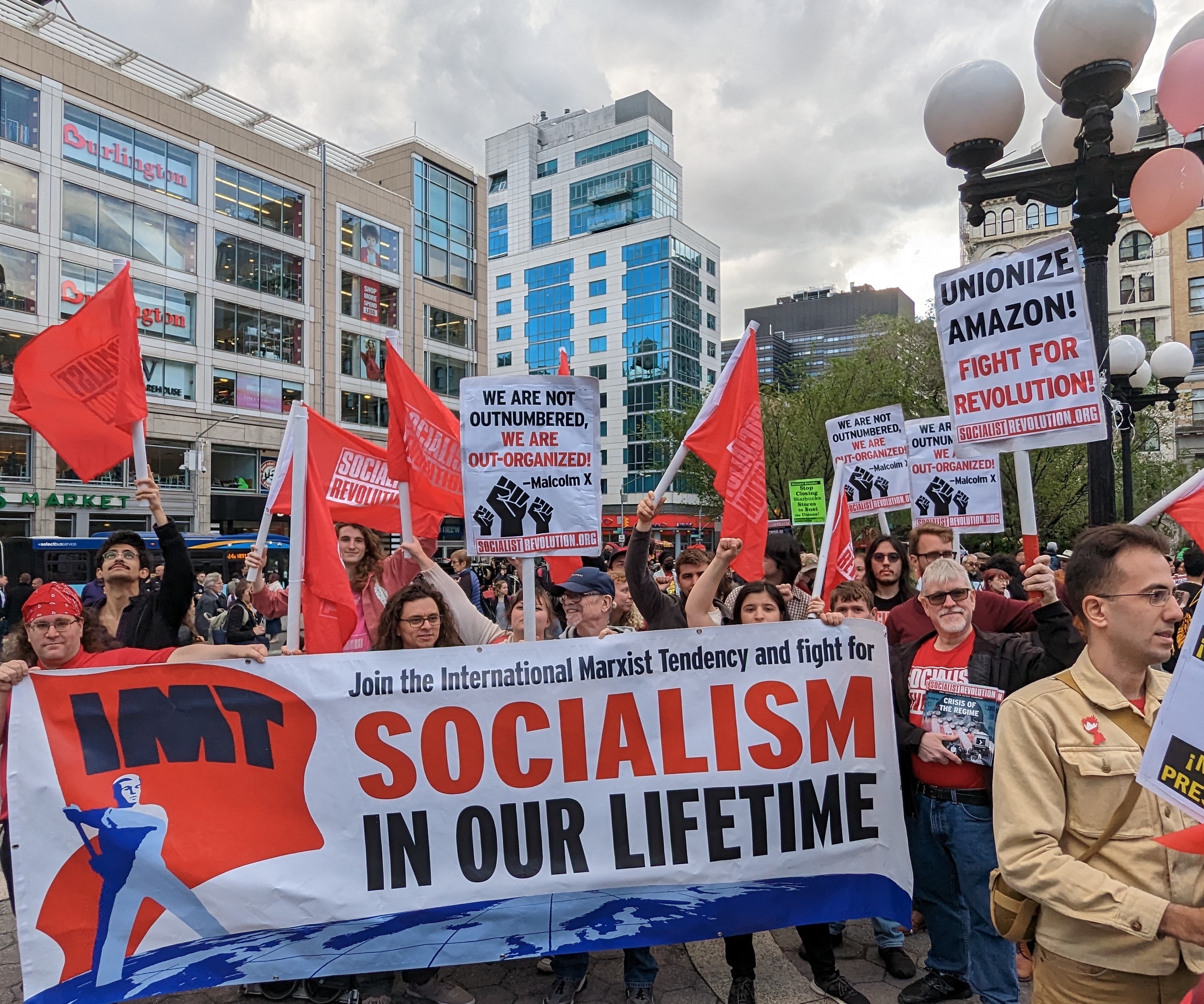
However, it should be noted that the tradition of May Day has been lost in the US – with the notable exception of the massive immigrant rights’ movement in 2006. Even though International Workers’ Day originated in this country to commemorate the Haymarket massacre in Chicago and the struggle for the eight-hour day, it has now been relegated to obscurity in favour of the ‘official’ Labor Day in September.
All the major trade unions mobilise merely for celebrations and parades on that state-sanctioned holiday, and there are no mass socialist organisations giving any kind of coordinated lead for 1 May. The Democratic Socialists of America (DSA) is the largest socialist organisation, but unfortunately they have never taken responsibility for organising real May Day rallies. In this context, it is all the more important for revolutionary Marxists to reclaim the legacy of May Day, even where our efforts are necessarily modest.
In New York City, dozens of Socialist Revolution comrades participated in three different rallies, eventually gathering at Union Square in Manhattan. They set up four tables with a large spread of Marxist literature, selling nearly 100 magazines, books and booklets. They also distributed leaflets to promote an upcoming event titled, “Labour on the Rise: Which Way Forward to Revolution?”, and 40 people signed up to join the IMT.
Just to the north of New York City, the New Haven branch mobilised for a march that ended in a protest at Yale University, just one day after organising a very successful May Day public meeting. Our comrades in Orange County also organised a meeting on the Haymarket massacre and the legacy of 1 May at the University of California in Irvine – one of the campuses that participated in the largest-ever higher education strikes in US history last year.
All in all, Socialist Revolution organised events and participated in rallies from coast to coast: from Boston to Los Angeles, Dallas to Chicago, Phoenix to Saint Louis, San Diego to Bellingham, Washington and beyond. Ahead of additional events coming up this weekend from branches in Minneapolis, Raleigh (North Carolina) and more, the comrades already signed up nearly 100 people looking to get involved in the fight for socialism in our lifetime – raising the banner of revolutionary Marxism and connecting the socialist programme with the rising tide of class struggle.
Venezuela
Comrades of Lucha de Clases – the IMT in Venezuela – took part in the May Day demonstrations called by the National Committee of the CNCTL, a body that brings together trade unions to fight for better wages, while opposing restrictions on the right to protest, the imprisonment of innocent workers and all the reactionary policies arising from the pact between the ruling PSUV leaders and the traditional oligarchy.
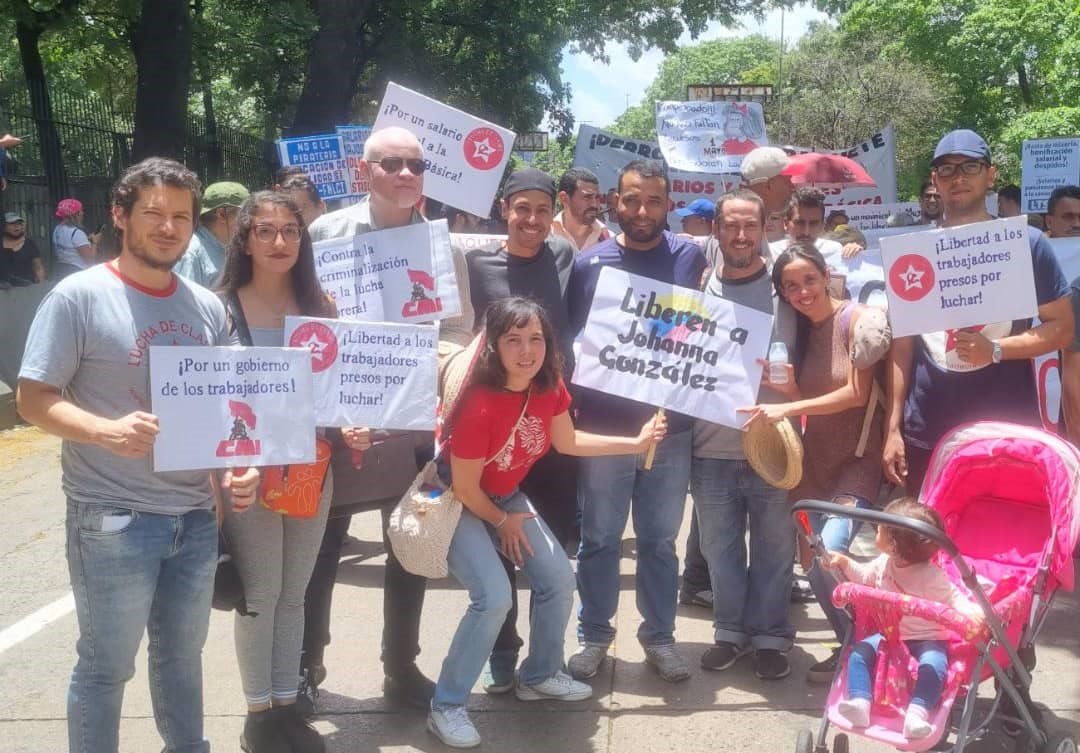
Unlike in previous years, there is a mood of growing militancy among a wider and wider layer of the working class. Workers are beginning to lose their fear of repression. While the union leaders try to contain it at every turn, there are numerous signs of mistrust among their rank and file. The latter are resisting the derailment of their struggles.
The government of Nicolás Maduro has adopted the policy dictated by the bosses’ union – Fedecámaras. They are keeping wages as low as possible (currently the minimum wage is equivalent to $5 per month), supplemented by bonuses not exceeding $60, whilst taking no measures to improve social benefits, holidays or utilities. At the same time, the government promises the creation of new Special Economic Zones, and is establishing an economy based on luxury consumption, while the absolute majority of the population cannot even cover its most basic needs.
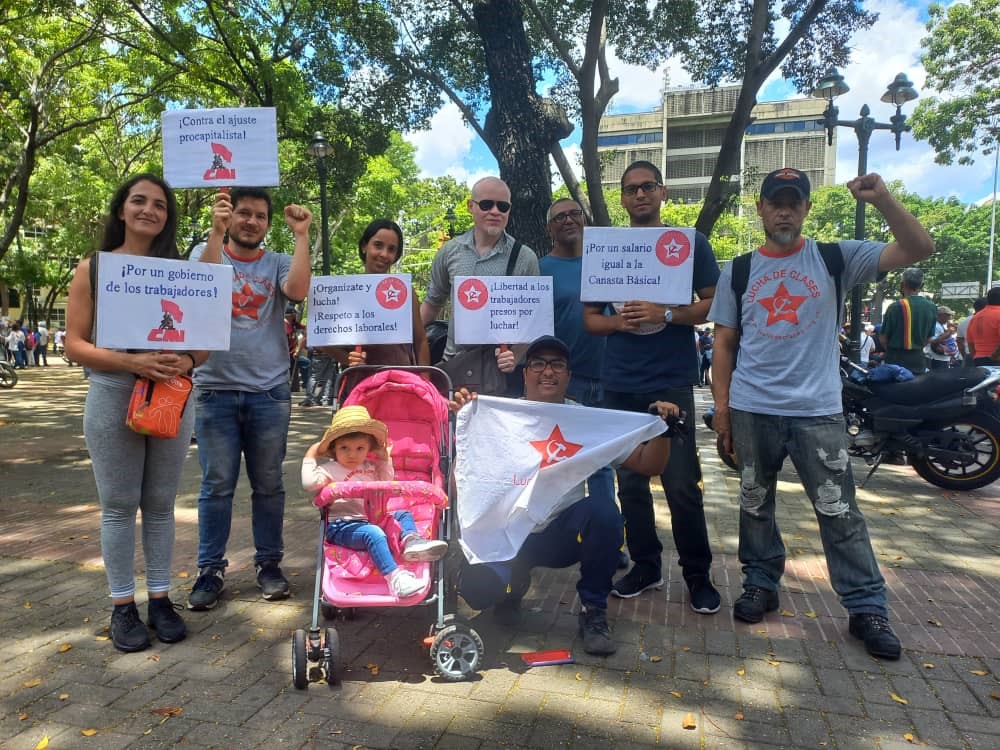
The Venezuelan comrades of the IMT participated in May Day demonstrations in the cities of Caracas, Valencia and Maracay. They raised the demands for independent working-class organisation, a sliding scale of wages, freedom for all workers imprisoned for protesting, and the national coordination of all workers’ struggles. The march in the capital could not reach its destination due to a heavy police blockade.
In addition to participating in these protests, the Venezuelan comrades are preparing a series of political activities linking May Day with the birthday of Karl Marx on 5 May. Political material will be distributed and discussions will be held on Marxist theory.
Yugoslavia
Across Yugoslavia there were May Day protests in the biggest cities. The Marxist tendency in Yugoslavia was present and intervened in Skopje, Banja Luka, Zagreb and Sarajevo. In total, 12 comrades were present and sold more than 40 copies of our papers Nova Iskra and Crvena Kritika. We also distributed more than 100 leaflets in Banja Luka.
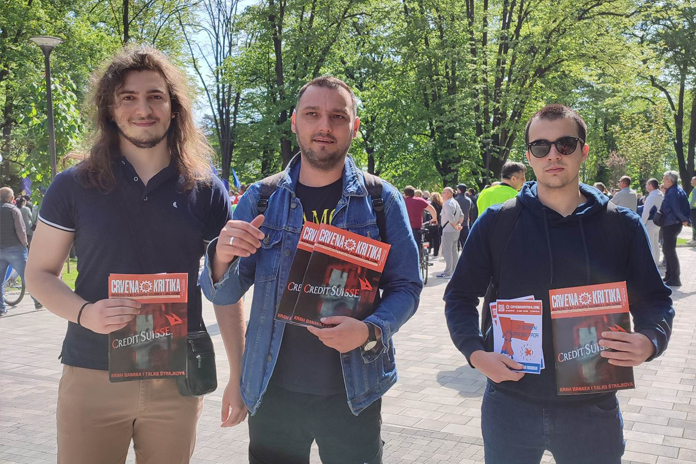
The number of protesters varied in different cities: 200 in Sarajevo, 300 in Banja Luka, around 70-80 in Zagreb, and more than 1,000 in Skopje. In general, there were no concrete demands coming from the organisers. The speeches by the trade union bureaucrats were typically reformist.
Notably, younger people were more interested in radical ideas, and some approached us to ask for our paper.

